Geothermal Heat Pumps
Experience Efficiency with a Geothermal Heat Pump Today!

Are you in search of an environmentally friendly and affordable heating solution for your home? Consider investing in a geothermal heat pump! This advanced system utilizes renewable energy from the ground, providing both heating and cooling functions. Unlike conventional furnaces and air conditioners, geothermal heat pumps are incredibly efficient, helping you save on both energy and costs.
Geothermal heat pumps work by drawing on the constant temperatures found underground. The system uses buried pipes to absorb heat from the ground during winter, warming your home, and in the summer, it removes heat from your home and transfers it back into the ground. With efficiency rates of 50% to 70% for heating and 20% to 40% for cooling, geothermal heat pumps outperform traditional heating and cooling systems.
Not only are geothermal heat pumps efficient, but they are also eco-friendly. These systems do not produce carbon dioxide greenhouse gas emissions, making them a sustainable choice for homeowners who prioritize environmental responsibility. By investing in a geothermal heat pump, you can experience the benefits of renewable energy and contribute to a greener future.
Key Takeaways:
- Geothermal heat pumps are an eco-friendly and cost-effective heating solution.
- They use renewable energy from the ground, making them a sustainable choice.
- Geothermal heat pumps are 50% to 70% more efficient for heating and 20% to 40% more efficient for cooling.
- These systems do not produce carbon dioxide greenhouse gas emissions.
- Investing in a geothermal heat pump can help you save energy and money.
How Geothermal Heat Pumps Work
A geothermal heat pump operates by utilizing a heat exchanger, which is responsible for the transfer of heat from one space to another. During the summer months, the heat pump extracts heat from the building and releases it into the ground for cooling purposes. Conversely, in the winter, it taps into the natural heat stored in the ground and transfers it to the home for efficient heating. This process allows geothermal heat pumps to achieve higher energy efficiency compared to traditional air-source heat pumps.
Geothermal heat pumps harness the constant ground temperatures to deliver impressive energy savings. They can reduce energy consumption by approximately 25% to 50% compared to air-source heat pump systems. Additionally, geothermal heat pumps can maintain high efficiencies even during the coldest winter nights, ensuring optimal heating performance throughout the year.
| Comparison | Geothermal Heat Pumps | Air-Source Heat Pumps |
|---|---|---|
| Energy Efficiency | 25% to 50% energy savings | Lower energy savings |
| Cold Climate Performance | High efficiency in extreme cold | Efficiency may decline in cold weather |
| Environmental Impact | Zero carbon dioxide emissions | Some carbon dioxide emissions |
| Long-Term Savings | Higher initial cost, but savings recouped in 5 to 10 years | Lower initial cost, but higher energy bills |
While the installation cost of geothermal heat pumps may be higher compared to traditional systems, the energy savings achieved can recoup the additional expenses within 5 to 10 years. Investing in a geothermal heat pump not only provides long-term cost-effectiveness but also contributes to a cleaner and more sustainable environment. By reducing energy consumption and eliminating carbon dioxide emissions, geothermal heat pumps offer a smart and eco-friendly solution for heating and cooling needs.
Benefits of Geothermal Heat Pumps
Geothermal heat pumps offer numerous benefits for homeowners. First and foremost, they are eco-friendly, providing a sustainable heating and cooling solution. Unlike traditional systems that rely on fossil fuels, geothermal heat pumps harness the natural heat from the earth, producing no carbon dioxide greenhouse gas emissions. This makes them an environmentally conscious choice for those looking to reduce their carbon footprint.
Not only are geothermal heat pumps eco-friendly, but they are also highly energy-efficient. These systems can provide significant energy savings compared to conventional heating and cooling methods. According to the Government of Canada, homeowners can save up to 65% in energy costs by using geothermal heat pumps. This makes them a cost-saving option in the long run, despite the higher initial installation costs.
Additionally, homeowners who install an Energy Star-approved geothermal heat pump may be eligible for a federal tax credit. In 2020, the tax credit is 26%, and in 2021, it will be 22%. This tax credit can further offset the initial investment and make geothermal heat pumps even more financially attractive. It’s important to note that these tax credits are subject to change, so it’s crucial to consult with a tax professional for the most up-to-date information.
| Benefits | Description |
|---|---|
| Eco-friendly | Geothermal heat pumps do not produce carbon dioxide greenhouse gas emissions, making them environmentally friendly. |
| Energy-efficient | These systems provide significant energy savings compared to traditional heating and cooling methods. |
| Cost-saving | Geothermal heat pumps can save homeowners up to 65% in energy costs. |
| Tax credits | Installing an Energy Star-approved geothermal heat pump may be eligible for a federal tax credit of 26% in 2020 and 22% in 2021. |
In summary, geothermal heat pumps offer a multitude of benefits for homeowners. From being eco-friendly and energy-efficient to providing cost-saving opportunities and tax credits, these systems are a worthwhile investment. By choosing a geothermal heat pump, homeowners can enjoy a comfortable indoor environment while reducing their carbon footprint and saving money on energy costs.
Installation and Maintenance of Geothermal Heat Pumps
Installing a geothermal heat pump system requires careful planning and professional expertise to ensure optimal performance and efficiency. The type of loop system used will depend on factors such as available land, soil conditions, and access to water bodies. Here are the different types of loop systems commonly used for geothermal heat pump installations:
- Horizontal: This cost-effective option is suitable for residential applications with sufficient land. Pipes are buried horizontally in trenches, and the system is connected to the heat pump.
- Vertical: Ideal for larger-scale systems with limited land and shallow soil, vertical installations involve drilling boreholes and inserting the pipes into the ground.
- Pond/Lake: If you have an adequate water body on your property, this option can be the least expensive. Pipes are laid underwater, utilizing the water as the heat exchange fluid.
- Open-Loop: This system utilizes well or surface water as the heat exchange fluid. It requires a water source and proper permits, making it less common for residential installations.
Once the geothermal heat pump system is installed, regular maintenance is essential to keep it running efficiently. Annual tune-ups by a professional HVAC technician are recommended to inspect and service the system. During the tune-up, the technician will:
- Check and replace air filters to ensure proper airflow and prevent debris buildup.
- Inspect the ground loop pump and antifreeze solution to ensure they are functioning correctly.
- Test the system’s components, including the compressor and refrigerant charge, to detect any issues.
- Ensure all electrical connections are secure and operating safely.
Regular maintenance not only helps prevent unexpected breakdowns but also extends the lifespan of your geothermal heat pump system. It is also crucial to address any leaks or performance issues promptly to avoid costly repairs and maximize energy efficiency.
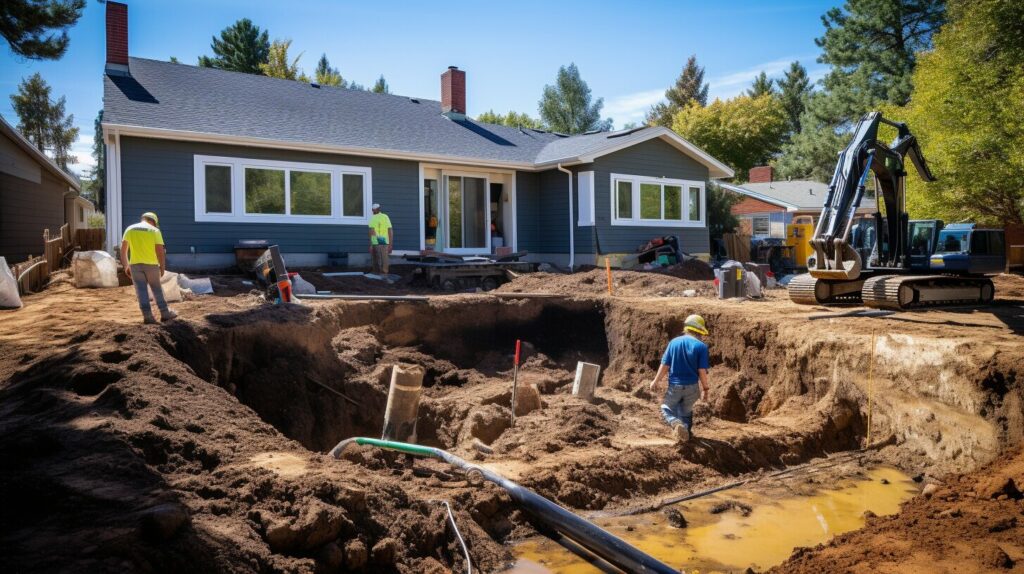
Comparison of Geothermal Heat Pump Loop Systems
| Loop System | Installation Cost | Space Requirements | Suitability |
|---|---|---|---|
| Horizontal | Low | Adequate land | Residential with sufficient land |
| Vertical | Moderate | Shallow soil | Larger-scale systems with limited land |
| Pond/Lake | Low | Adequate water body | Residential or commercial with water source |
| Open-Loop | Moderate | Requires water source and permits | Residential or commercial with access to well or surface water |
Troubleshooting and Maintenance Tips for Geothermal Heat Pumps
If you encounter any issues with your geothermal heat pump, there are several troubleshooting steps you can take before calling a professional. Start by checking the thermostat and ensuring it is set to the correct temperature. Sometimes a simple adjustment can resolve the problem.
Next, inspect the air filters and clean or replace them if they are dirty. Dirty air filters can restrict airflow, leading to reduced system performance. Regularly maintaining clean filters is essential for optimal operation.
It is also crucial to check for any obstructions that may be blocking airflow around the unit. Clear away any debris or objects that might hinder proper ventilation. Improper airflow can cause the system to work harder, leading to decreased efficiency and potential malfunctions.
If the problem persists or you notice other issues such as low cooling output, leaks, or strange noises, it is best to contact a professional HVAC technician. They can inspect the refrigerant charge, ductwork, compressor, and other components to identify and resolve any underlying problems. Addressing these issues promptly can prevent further damage and ensure your geothermal heat pump operates at its best.
| Issue | Troubleshooting Steps |
|---|---|
| Low cooling output | – Check and clean air filters – Ensure proper airflow around the unit – Verify thermostat settings |
| Leaks | – Inspect the system for visible leaks – Contact a professional technician for repairs |
| Strange noises | – Listen for unusual sounds – Have a technician inspect the system for potential issues |
| Dirty air filters | – Clean or replace air filters regularly – Follow manufacturer’s recommendations for maintenance |
Regular maintenance is key to keeping your geothermal heat pump running efficiently. Besides addressing any problems, it is essential to schedule an annual tune-up by a professional. During the tune-up, experts will inspect and service the system, including checking and replacing air filters, inspecting the ground loop pump and antifreeze, and ensuring all components are running smoothly. Taking preventive measures and addressing issues promptly can help prolong the lifespan of your geothermal heat pump and ensure it continues to provide efficient and reliable heating and cooling for your home.
Conclusion
Upgrade to a geothermal heat pump today and experience the benefits of an energy-efficient heating system. Geothermal heat pumps offer a cost-effective and eco-friendly solution for your home’s heating and cooling needs. By harnessing the constant temperature of the ground, these systems can significantly reduce your energy consumption and carbon footprint.
Although the initial installation cost may be higher, the long-term energy savings and potential tax credits make geothermal heat pumps a worthwhile investment. You can save up to 65% in energy costs compared to traditional heating and cooling systems. Plus, installing an Energy Star-approved geothermal heat pump makes you eligible for a federal tax credit.
Regular maintenance and prompt repairs are essential to keep your geothermal heat pump running efficiently. Annual inspections and addressing any leaks promptly will ensure optimal performance and a long lifespan for your system. With a geothermal heat pump, you can enjoy an energy-efficient, cost-effective, and eco-friendly heating system for your home.
What Makes Geothermal Heat Pumps More Efficient in Sustainable Buildings?
Geothermal heat pump efficiency in sustainable buildings is notable due to its environmentally friendly approach. By tapping into the Earth’s natural, constant temperature, these systems provide both heating and cooling, reducing reliance on fossil fuels. This renewable energy source minimizes carbon emissions and decreases energy consumption, making it a greener choice for sustainable buildings.
FAQ
What is a geothermal heat pump?
A geothermal heat pump is a highly efficient and environmentally friendly heating and cooling system that uses renewable energy from the ground. It draws heat from the ground to warm your home in the winter and removes heat from your home to cool it in the summer.
How does a geothermal heat pump work?
A geothermal heat pump works by using a heat exchanger to transfer heat from one space to another. In the summer, it extracts heat from the building and transfers it to the ground for cooling. In the winter, it takes natural heat from the ground and transfers it to the home for heating.
What are the benefits of geothermal heat pumps?
Geothermal heat pumps are eco-friendly, energy-efficient, and cost-effective. They do not produce carbon dioxide emissions, provide significant energy savings compared to traditional systems, and can save homeowners up to 65% in energy costs. Additionally, installing an Energy Star-approved geothermal heat pump is eligible for a federal tax credit.
How is a geothermal heat pump installed and maintained?
The installation of a geothermal heat pump system can vary depending on the type of loop system used. It is important to have a professional inspect and service the system annually to ensure its proper operation and longevity.
What troubleshooting and maintenance tips are there for geothermal heat pumps?
If you encounter issues with your geothermal heat pump, you can check the thermostat, inspect the air filter, and ensure there are no obstructions blocking airflow. If the problem persists, it is best to have a professional inspect the refrigerant charge, ductwork, compressor, and other components. Regular maintenance, including annual inspections and addressing any leaks promptly, is crucial.
Geothermal Heat Pumps
Unlocking the Magic of Geothermal Heat Pump Technology

Come explore with us the fascinating world of geothermal heat pump technology! This article will reveal the secrets behind this innovative and environmentally friendly method of heating our homes.
Get ready to be amazed as we delve into the science and practicality of harnessing the Earth’s renewable energy.
From understanding the geothermal heat exchange process to comparing it with traditional HVAC systems, we’ve got you covered.
So, let’s embark on this journey together and unlock the wonders of geothermal heat pump technology!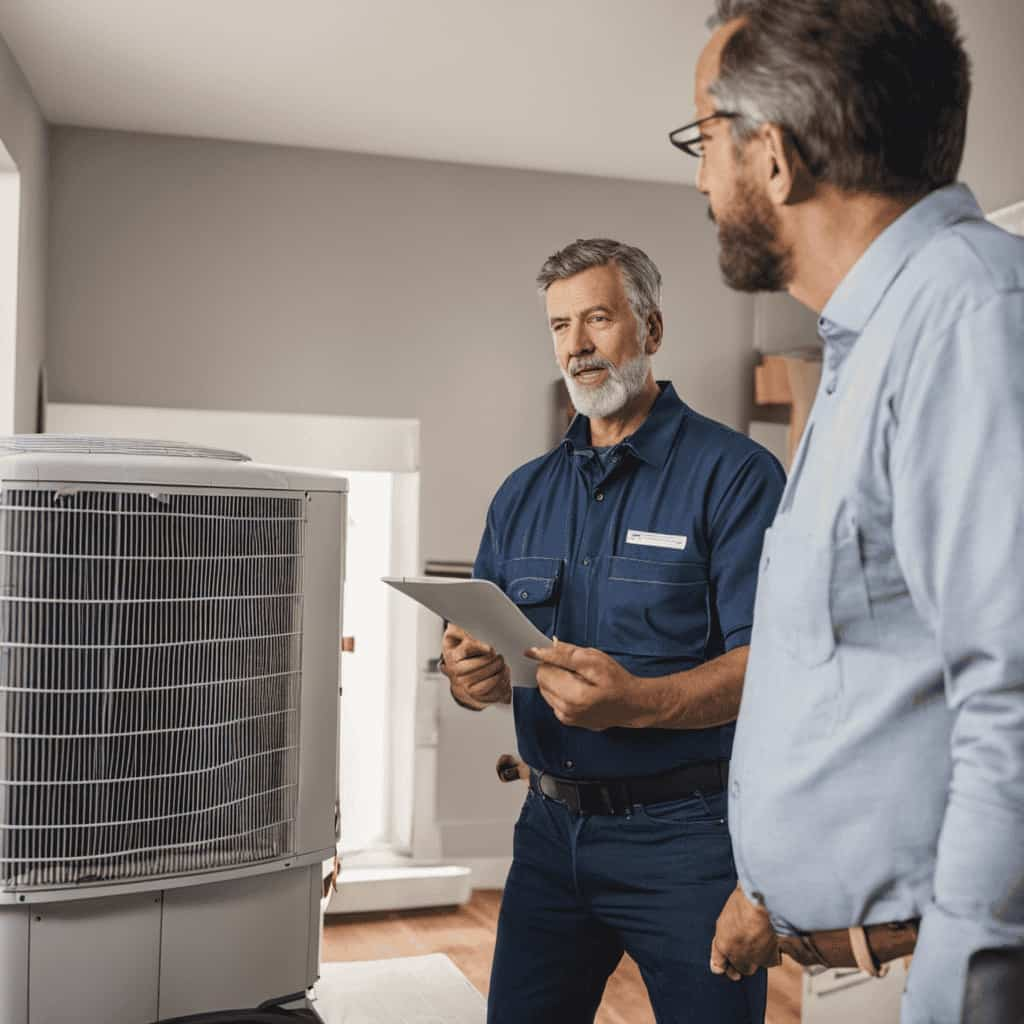
Key Takeaways
- Geothermal heat pumps harness the Earth’s natural heat to provide sustainable and efficient heating and cooling systems.
- Geothermal heat pumps reduce energy consumption, lower utility bills, and have a smaller carbon footprint compared to traditional systems.
- Geothermal heat pumps maximize energy efficiency, provide consistent and comfortable indoor environments, and have a long lifespan.
- Geothermal heat pump systems may have a higher upfront cost but lead to cost savings over time due to lower operating and maintenance costs.
The Science Behind Geothermal Heat Pump Technology
In this article, we’ll explore the science behind geothermal heat pump technology. Let’s dive into the fascinating world of geothermal energy and how it can revolutionize the way we heat and cool our homes.
Geothermal heat pumps work by harnessing the Earth’s natural heat, which remains constant deep below the surface. This heat is then transferred to our homes through a series of pipes buried underground. The magic lies in the heat transfer process, where the pump uses refrigerant to absorb and release heat, effectively warming or cooling the air inside our homes.
Understanding the science behind geothermal heat pump technology is crucial in unlocking its full potential and reaping the benefits of a more sustainable and efficient heating and cooling system.
Now, let’s delve deeper into the process of geothermal heat exchange and how it contributes to the overall functionality of these remarkable systems.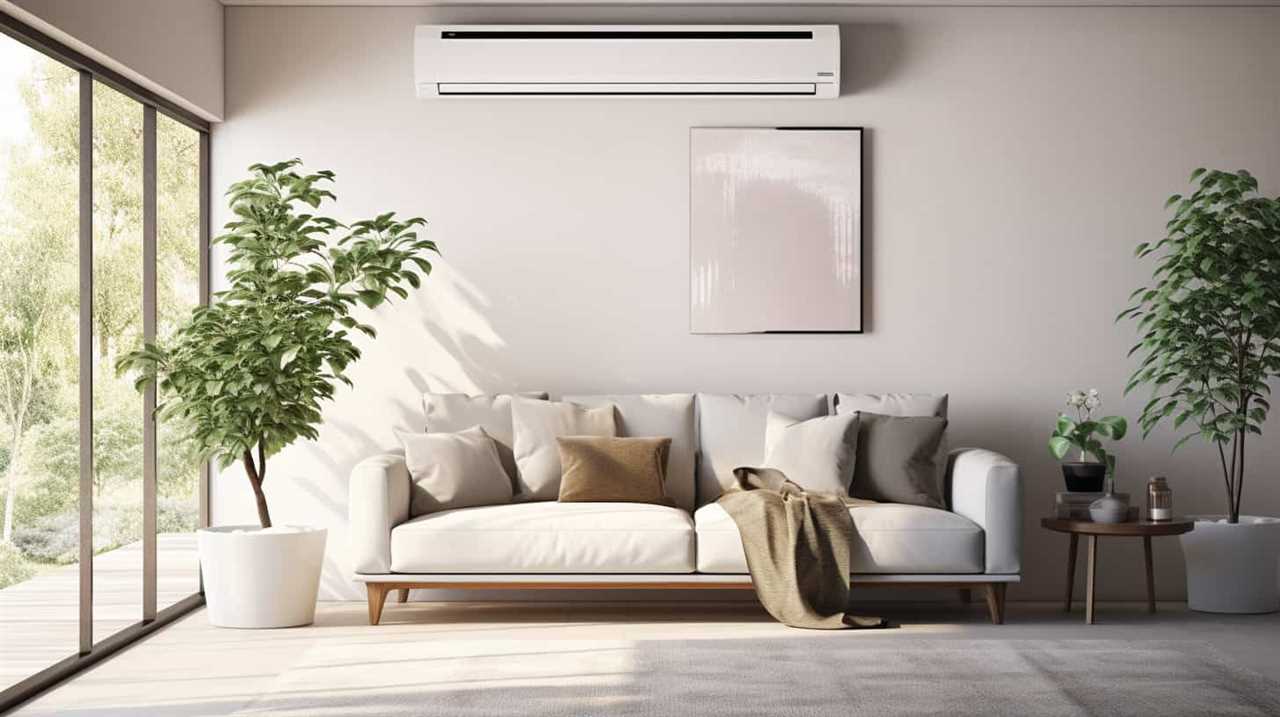
Understanding the Geothermal Heat Exchange Process
Let’s talk about the energy efficiency benefits and environmental sustainability advantages of the geothermal heat exchange process.
By utilizing the Earth’s natural heat, geothermal heat pumps can significantly reduce energy consumption and lower utility bills.
Additionally, this technology produces no greenhouse gas emissions, making it a clean and environmentally friendly heating and cooling solution.
Energy Efficiency Benefits
We can maximize our energy efficiency by understanding the geothermal heat exchange process. By harnessing the power of the earth’s natural heat, geothermal heat pumps provide numerous benefits that can significantly reduce our energy consumption and costs.

Here are some key advantages:
Lower energy bills: Geothermal heat pumps use the earth’s constant temperature to heat and cool our homes, reducing the need for traditional energy sources and lowering our utility bills.
Environmental friendliness: By tapping into renewable energy, geothermal heat pumps produce fewer greenhouse gas emissions, helping to combat climate change and protect our planet.
Increased comfort: Geothermal systems distribute heat more evenly throughout our homes, eliminating hot and cold spots and providing a consistent and comfortable indoor environment.
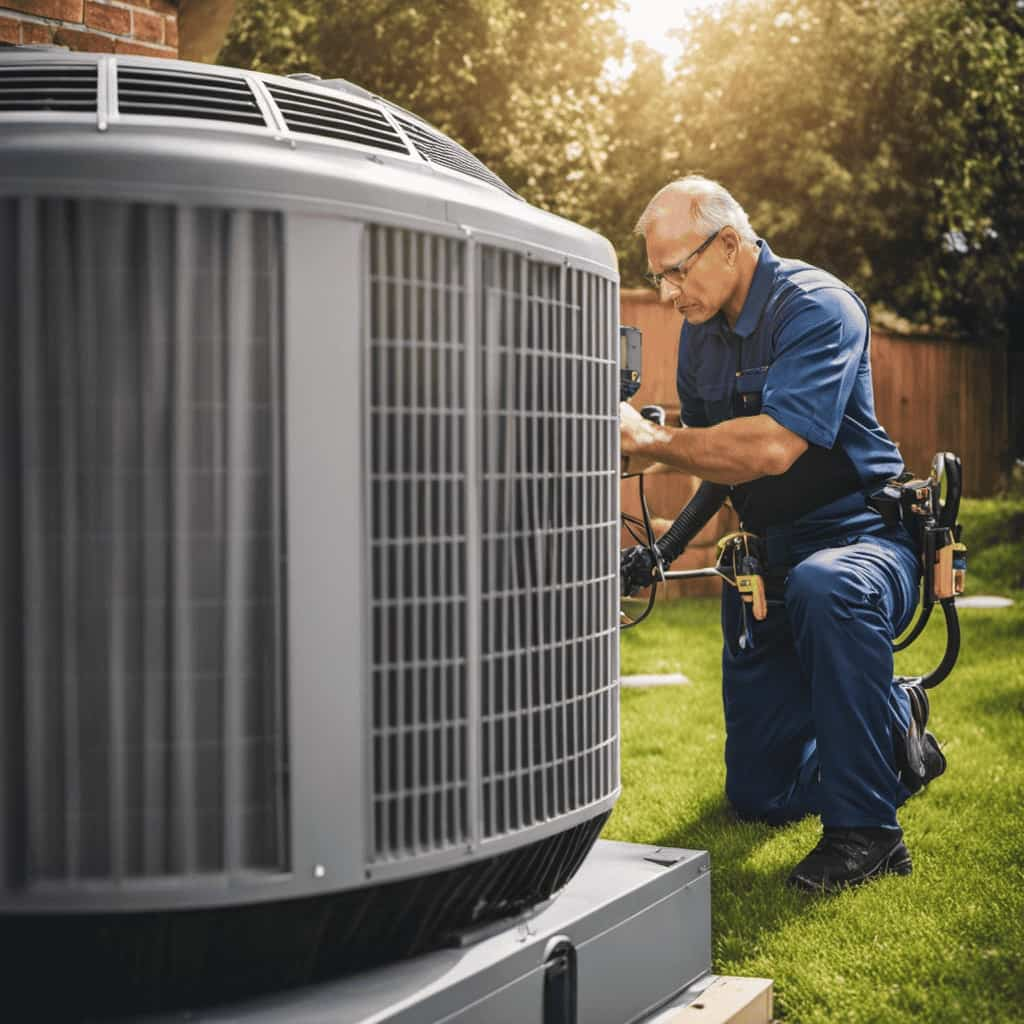
Long lifespan: Geothermal heat pumps are built to last, with an average lifespan of 25 years or more, providing reliable and efficient heating and cooling for many years to come.
Understanding the geothermal heat exchange process allows us to unlock the full energy efficiency potential of geothermal technology, benefiting both our wallets and the environment.
Environmental Sustainability Advantages
By harnessing the geothermal heat exchange process, we can enjoy multiple environmental sustainability advantages. The beauty of this technology lies in the fact that it taps into the Earth’s natural heat, making it a renewable energy source. This means that we can reduce our reliance on fossil fuels, which have detrimental effects on the environment.
Geothermal heat pumps also have a smaller carbon footprint compared to traditional heating and cooling systems. They emit fewer greenhouse gases, helping to combat climate change. Additionally, geothermal systems don’t require the burning of any fuel, eliminating air pollution and reducing our impact on local air quality.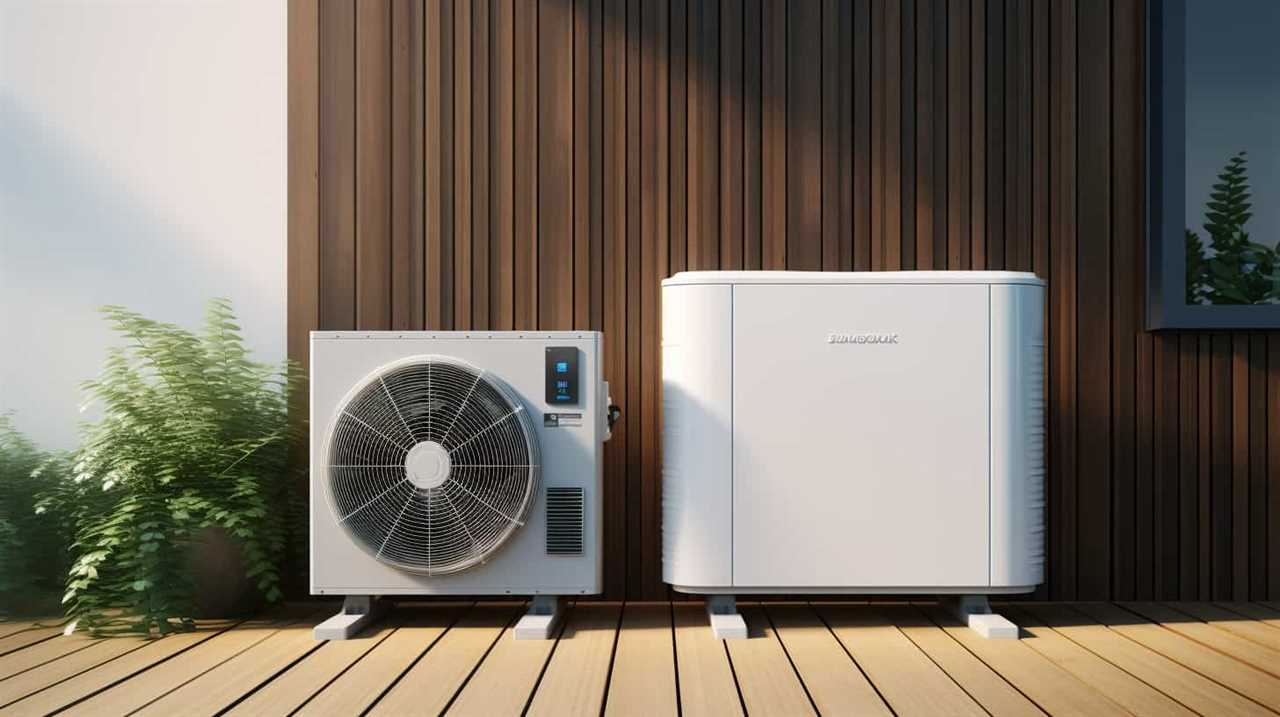
It’s a win-win situation for both the planet and us, as we can enjoy a comfortable indoor climate while knowing we’re making a positive difference in preserving our environment.
Harnessing the Earth’s Renewable Energy With Geothermal Technology
Harnessing the Earth’s renewable energy begins with understanding the potential of geothermal technology. This innovative technology utilizes the natural heat stored beneath the Earth’s surface to provide clean and sustainable energy solutions.
Here are four key benefits of geothermal technology:
Energy Efficiency: Geothermal systems are highly efficient, using up to 70% less energy compared to traditional heating and cooling systems, resulting in significant cost savings.

Environmental Friendliness: Geothermal technology produces no greenhouse gas emissions and has a minimal impact on the environment, making it a sustainable energy choice.
Versatility: Geothermal systems can be used for various applications, including heating, cooling, and even water heating, providing a comprehensive solution for residential, commercial, and industrial needs.
Longevity: Geothermal systems have a lifespan of 20 to 25 years, requiring minimal maintenance and offering long-term reliability.
Exploring the Different Types of Geothermal Heat Pump Systems
Let’s delve into the various types of geothermal heat pump systems available and explore their unique features and benefits. Here are three common types of geothermal heat pump systems: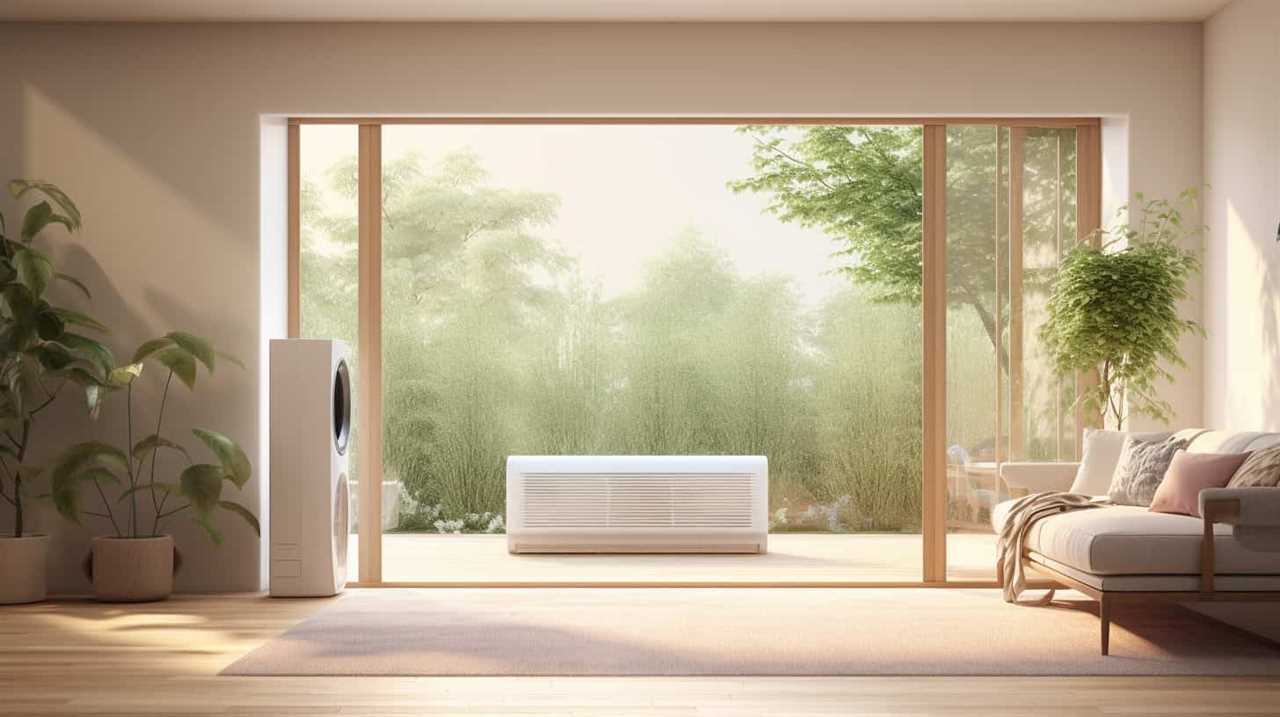
| Type | Description |
|---|---|
| Closed-loop systems | These systems circulate a mixture of water and antifreeze through a closed loop of pipes buried underground. They are highly efficient and can be installed horizontally or vertically. |
| Open-loop systems | These systems pump water from a well or a nearby water source and use it to heat or cool the home. They are less expensive to install but may require a larger water source and additional maintenance. |
| Hybrid systems | These systems combine geothermal heat pumps with other heating and cooling technologies, such as a traditional furnace or air conditioner. They offer flexibility and can be tailored to the specific needs of the home. |
Understanding the different types of geothermal heat pump systems allows homeowners to choose the best option for their heating and cooling needs. Now, let’s explore the benefits of geothermal heat pump technology for home heating.
Benefits of Geothermal Heat Pump Technology for Home Heating
When it comes to home heating, geothermal heat pump technology offers a range of benefits that we can’t ignore.
Firstly, these systems provide energy efficiency advantages, allowing us to significantly reduce our energy consumption and lower our utility bills.
Secondly, geothermal heat pumps have the potential for cost savings, as they require less maintenance and have longer lifespans compared to traditional heating systems.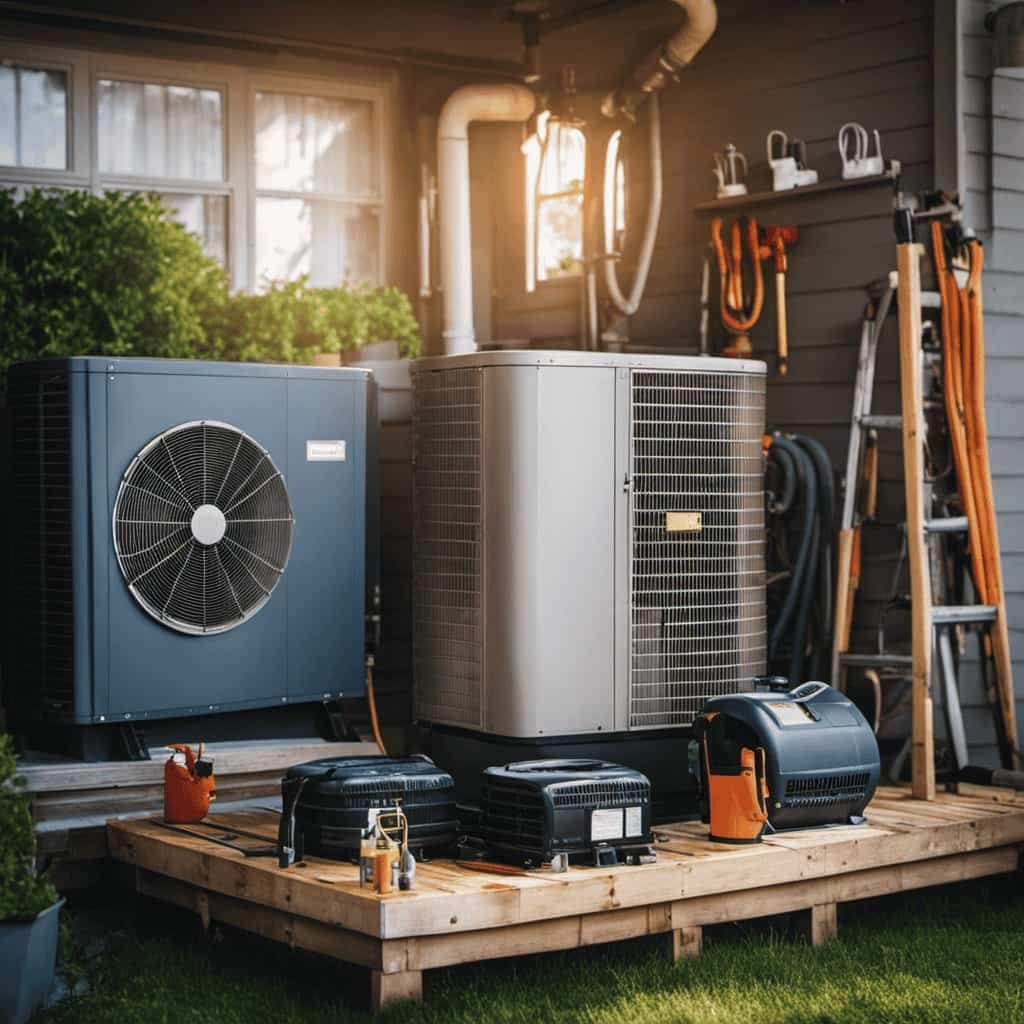
Lastly, these systems promote environmental sustainability by using renewable energy sources and producing fewer greenhouse gas emissions.
Energy Efficiency Advantages
We can maximize energy efficiency by utilizing the benefits of geothermal heat pump technology for home heating. Geothermal heat pumps offer several advantages that can help homeowners reduce their energy consumption and lower their utility bills.
Consistent and efficient heating: Geothermal heat pumps use the stable temperature of the earth to provide a reliable source of heat, resulting in consistent and efficient heating throughout the year.
Lower operating costs: By harnessing the renewable energy stored in the ground, geothermal heat pumps can significantly reduce the amount of electricity or fossil fuels needed to heat a home, leading to lower operating costs.
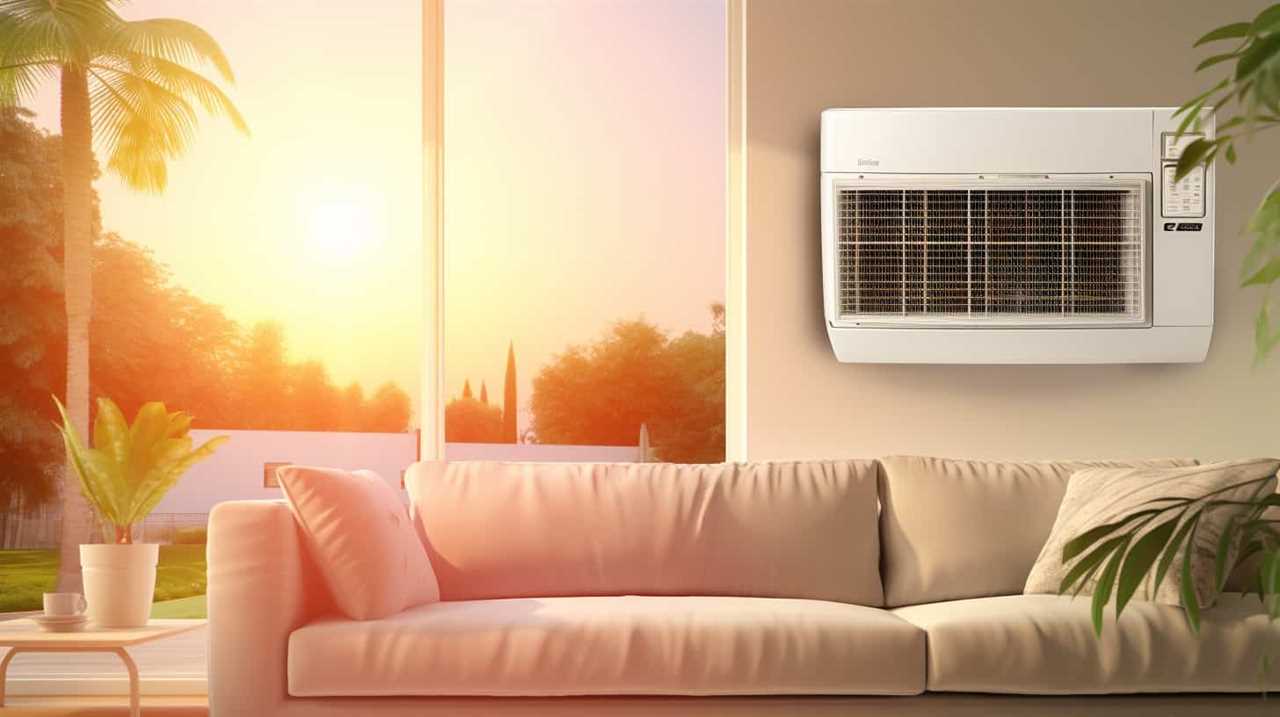
Reduced carbon footprint: Geothermal heat pump systems produce fewer greenhouse gas emissions compared to traditional heating systems, helping to reduce your carbon footprint and contribute to a more sustainable future.
Long lifespan and low maintenance: Geothermal heat pumps are built to last and require minimal maintenance, providing homeowners with peace of mind and long-term savings.
Cost Savings Potential
We can save money by utilizing geothermal heat pump technology for home heating. Not only does this technology provide a more efficient way to heat our homes, but it also offers significant cost savings in the long run. Let’s take a look at the potential savings we can enjoy:
| Cost Comparison | Geothermal Heat Pump | Conventional Heating |
|---|---|---|
| Initial Cost | Higher upfront cost | Lower upfront cost |
| Operating Cost | Lower energy bills | Higher energy bills |
| Maintenance Cost | Minimal maintenance | Regular maintenance |
As you can see from the table, while the initial cost of installing a geothermal heat pump may be higher, the operating and maintenance costs are significantly lower. This means that over time, we can expect to save money on our heating expenses. By choosing geothermal heat pump technology, we are not only making a financially wise decision, but we are also taking a step towards a more sustainable future.
Now, let’s explore the environmental sustainability benefits that geothermal heat pump technology brings.
Environmental Sustainability Benefits
Geothermal heat pump technology offers significant environmental sustainability benefits for home heating. Here are four reasons why it’s a great choice for those who desire a more intimate relationship with the environment:
Reduced carbon emissions: Geothermal heat pumps use the earth’s natural heat, eliminating the need for fossil fuel combustion. This results in a significant reduction in carbon dioxide emissions, helping to combat climate change.
Energy efficiency: Geothermal systems are incredibly efficient, using up to 50% less electricity compared to traditional heating systems. This not only reduces energy consumption but also lowers utility bills.
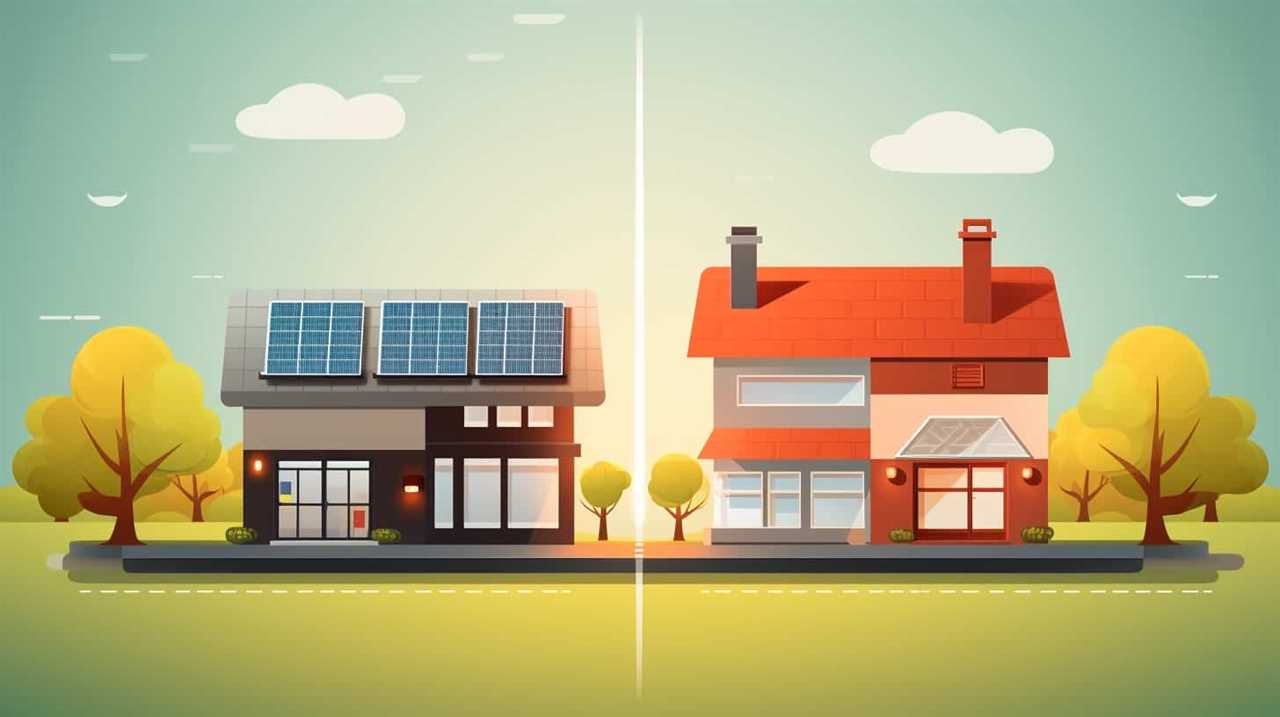
Renewable energy source: The earth’s heat is a renewable resource, meaning it will never run out. By tapping into this source, geothermal heat pumps provide a sustainable heating solution for homes.
Improved air quality: Unlike combustion-based heating systems, geothermal heat pumps don’t produce smoke or harmful emissions. This helps to maintain clean and healthy indoor air quality for you and your loved ones.
Geothermal Cooling: How It Works and Why It’s Efficient
When it comes to geothermal cooling, we can’t help but be amazed at how it works and why it’s so efficient.
Geothermal cooling harnesses the Earth’s natural heat exchange process to cool our homes and buildings. It works by circulating a fluid, usually a mixture of water and antifreeze, through underground pipes called loops. These loops are buried deep in the ground where the temperature remains relatively constant throughout the year.

The fluid absorbs heat from the indoor air and carries it to the loops, where it’s released into the ground. This process is incredibly efficient because it takes advantage of the Earth’s constant temperature, which is cooler than the outdoor air in the summer.
As a result, geothermal cooling uses significantly less energy compared to traditional air conditioning systems, making it a sustainable and cost-effective solution for cooling our spaces.
Geothermal Heat Pumps Vs. Traditional HVAC Systems: a Comparison
When comparing geothermal heat pumps to traditional HVAC systems, there are two key points to consider: efficiency and environmental impact.
Geothermal heat pumps are known for their superior energy efficiency, as they utilize the constant temperature of the ground to heat and cool homes.
In contrast, traditional HVAC systems rely on burning fossil fuels or consuming electricity, resulting in higher energy consumption and greenhouse gas emissions.
Efficiency Comparison: Geothermal Vs. Traditional HVAC
We can compare the efficiency of geothermal heat pumps and traditional HVAC systems by analyzing their energy consumption and cost savings.
When it comes to energy consumption, geothermal heat pumps have a significant advantage. They utilize the stable temperature of the earth to heat and cool a building, resulting in lower energy usage compared to traditional HVAC systems. This not only reduces the environmental impact but also leads to substantial cost savings in the long run.
Additionally, geothermal heat pumps can provide both heating and cooling, eliminating the need for separate systems. They also have a longer lifespan and require less maintenance, further contributing to their efficiency.
Environmental Impact Analysis: Geothermal Vs. Traditional HVAC
Geothermal heat pumps and traditional HVAC systems can be compared to analyze their environmental impact.
When it comes to the environment, geothermal heat pumps have a significant advantage over traditional HVAC systems. The use of geothermal heat pumps reduces greenhouse gas emissions, as they rely on the natural heat from the ground instead of burning fossil fuels. This means less carbon dioxide and other harmful pollutants are released into the atmosphere.
Additionally, geothermal systems use less electricity, leading to a decreased demand for energy production, which further reduces environmental impact.
Traditional HVAC systems, on the other hand, rely on the combustion of fossil fuels and consume more electricity, resulting in higher greenhouse gas emissions.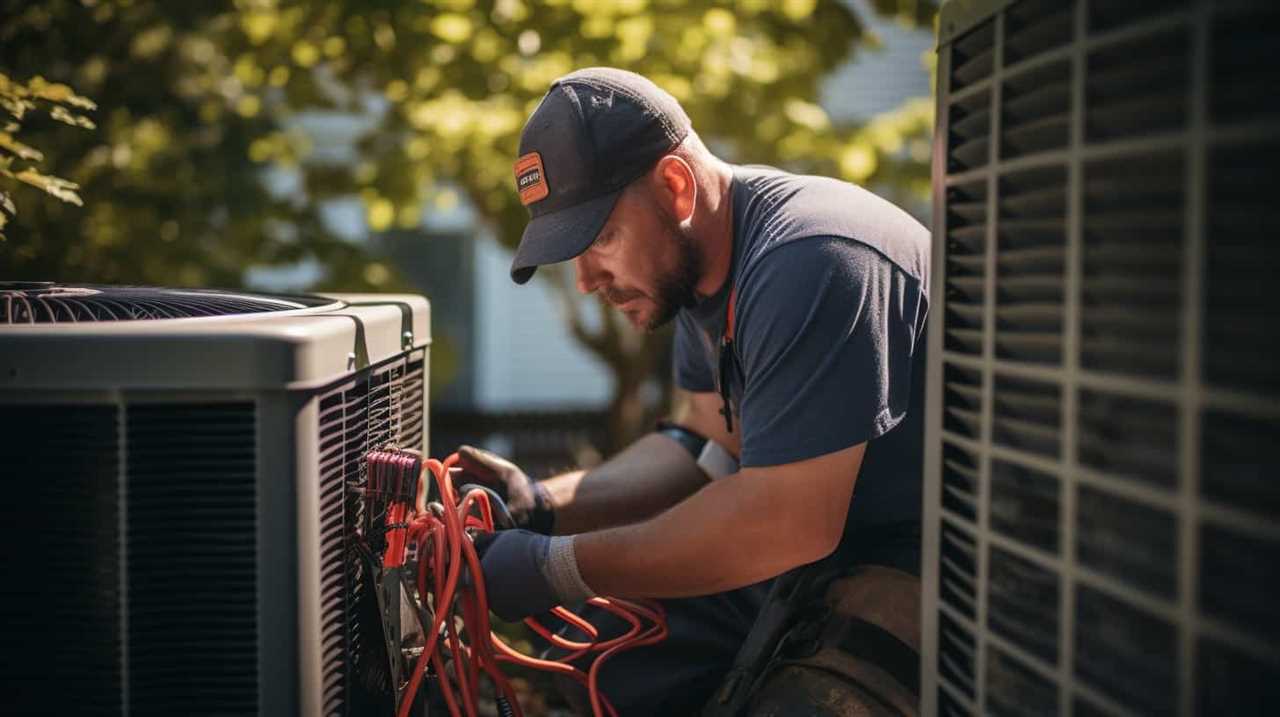
In terms of environmental sustainability, geothermal heat pumps are a clear winner.
Factors to Consider When Installing a Geothermal Heat Pump System
One important factor to consider when installing a geothermal heat pump system is the size of our property. It’s crucial to assess whether our property has enough space for the geothermal system to be installed.
Here are some other factors to consider:
Soil type: Understanding the soil composition is essential, as it affects the efficiency of the system. Certain soil types, like sandy or loamy soils, are more conducive to geothermal heat transfer.

Access to water: Geothermal heat pump systems require a water source for heat exchange. If our property doesn’t have access to a well or a nearby water body, alternative options like closed-loop systems may need to be considered.
Existing infrastructure: Assessing the condition of our property’s existing infrastructure, such as ductwork and electrical systems, will help determine if any modifications or upgrades are necessary.
Climate: The local climate plays a role in the system’s efficiency. Understanding the heating and cooling demands of our region will help determine the appropriate size and type of geothermal heat pump system to install.
Considering these factors will ensure a successful installation and optimal performance of our geothermal heat pump system.
Maintaining and Troubleshooting Geothermal Heat Pump Systems
To ensure the optimal performance of our geothermal heat pump system, it’s important to regularly maintain and troubleshoot it. By doing so, we can prevent potential issues and ensure that our system continues to provide us with efficient heating and cooling.
Regular maintenance includes tasks such as cleaning or replacing air filters, inspecting and cleaning the coils, and checking the refrigerant levels. It’s also crucial to regularly monitor the system’s performance and address any unusual noises or changes in temperature promptly.
Troubleshooting may involve identifying and fixing issues such as leaks, faulty thermostats, or electrical problems. By taking the time to maintain and troubleshoot our geothermal heat pump system, we can maximize its lifespan and enjoy its benefits for years to come.
The Future of Geothermal Heat Pump Technology and Sustainability
We must embrace innovation and explore new possibilities for the continued development and sustainability of geothermal heat pump technology. As we look to the future, there are several key areas of focus that will drive the advancement of this technology:

Efficiency: We’re constantly striving to improve the efficiency of geothermal heat pump systems, ensuring that they consume less energy while providing optimal heating and cooling.
Integration with Renewable Energy Sources: By integrating geothermal heat pump technology with other renewable energy sources such as solar and wind, we can create more sustainable and eco-friendly heating and cooling solutions.
Smart Technology: The future of geothermal heat pump technology lies in the integration of smart technology, allowing for better control, monitoring, and optimization of the system’s performance.
Geothermal Heat Pump Innovations: Through ongoing research and development, we aim to innovate and improve geothermal heat pump technology, making it more accessible, cost-effective, and efficient for a wider range of applications.

Frequently Asked Questions
How Much Does It Cost to Install a Geothermal Heat Pump System?
Well, the cost of installing a geothermal heat pump system can vary depending on factors like location and system size. However, it’s important to consider the long-term benefits and energy savings it provides.
Can a Geothermal Heat Pump System Be Installed in Any Type of Home?
Yes, a geothermal heat pump system can be installed in any type of home. It’s a versatile technology that can provide efficient heating and cooling, reducing energy costs and carbon emissions.
How Long Does It Typically Take to Recoup the Initial Investment of a Geothermal Heat Pump System?
It typically takes a few years to recoup the initial investment of a geothermal heat pump system. However, the long-term energy savings and increased home value make it a worthwhile investment for our homes.
Are There Any Government Incentives or Rebates Available for Installing a Geothermal Heat Pump System?
Yes, there are government incentives and rebates available for installing a geothermal heat pump system. We can help you navigate through the process and maximize your savings. Let’s unlock the magic together!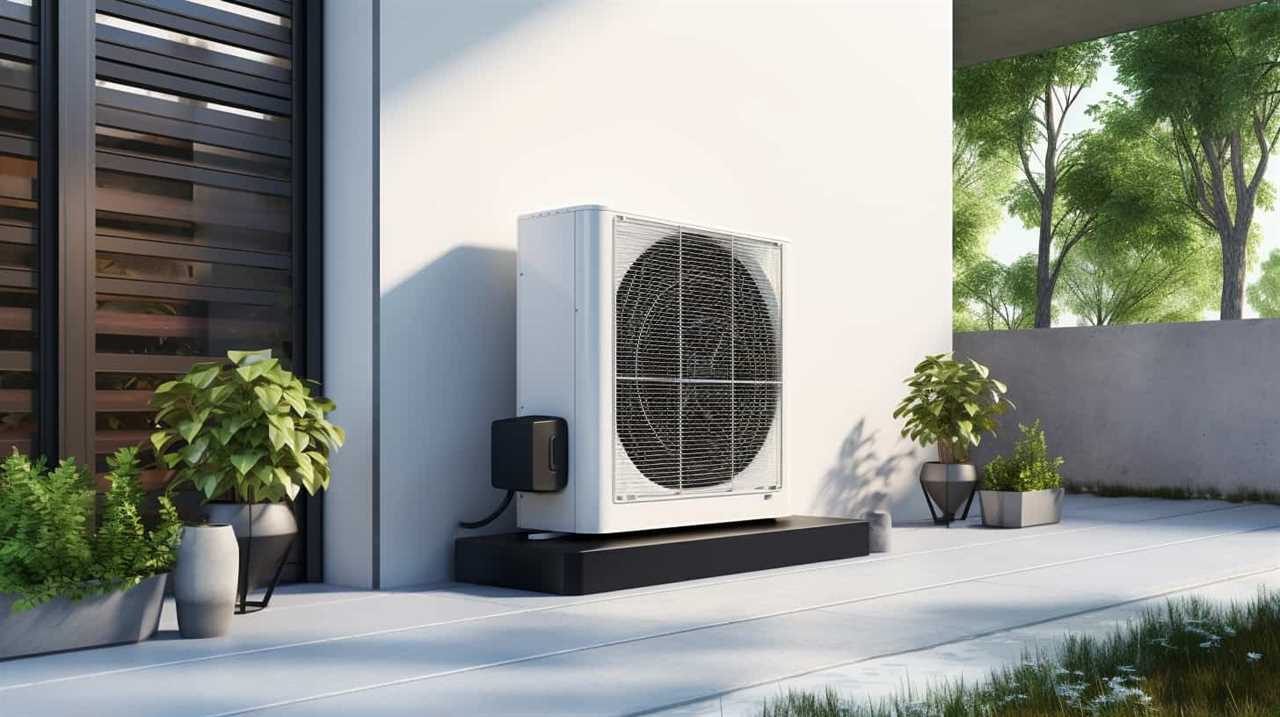
Can a Geothermal Heat Pump System Be Used for Both Heating and Cooling in a Home?
Yes, a geothermal heat pump system can be used for both heating and cooling in a home. It’s a versatile technology that harnesses the Earth’s natural heat and transfers it to provide comfortable temperatures year-round.
What Are the Recommended Maintenance Practices for Geothermal Heat Pumps?
Regular and thriving geothermal heat pump maintenance is crucial for optimal performance. Firstly, ensure proper air flow by regularly cleaning or changing filters. Check electrical connections and thermostat settings to avoid any malfunctions. Periodically inspect refrigerant levels and evaporator/coil cleanliness. Lastly, schedule professional maintenance annually to ensure all components are functioning efficiently.
Conclusion
In conclusion, geothermal heat pump technology is like a hidden treasure buried deep within the earth, waiting to be unlocked. By harnessing the Earth’s renewable energy, we can tap into a magical source of power that provides efficient and sustainable heating for our homes.
With its numerous benefits and the potential for a greener future, geothermal heat pumps truly hold the key to a more eco-friendly and comfortable world.
Let’s embrace this technology and unlock its full potential.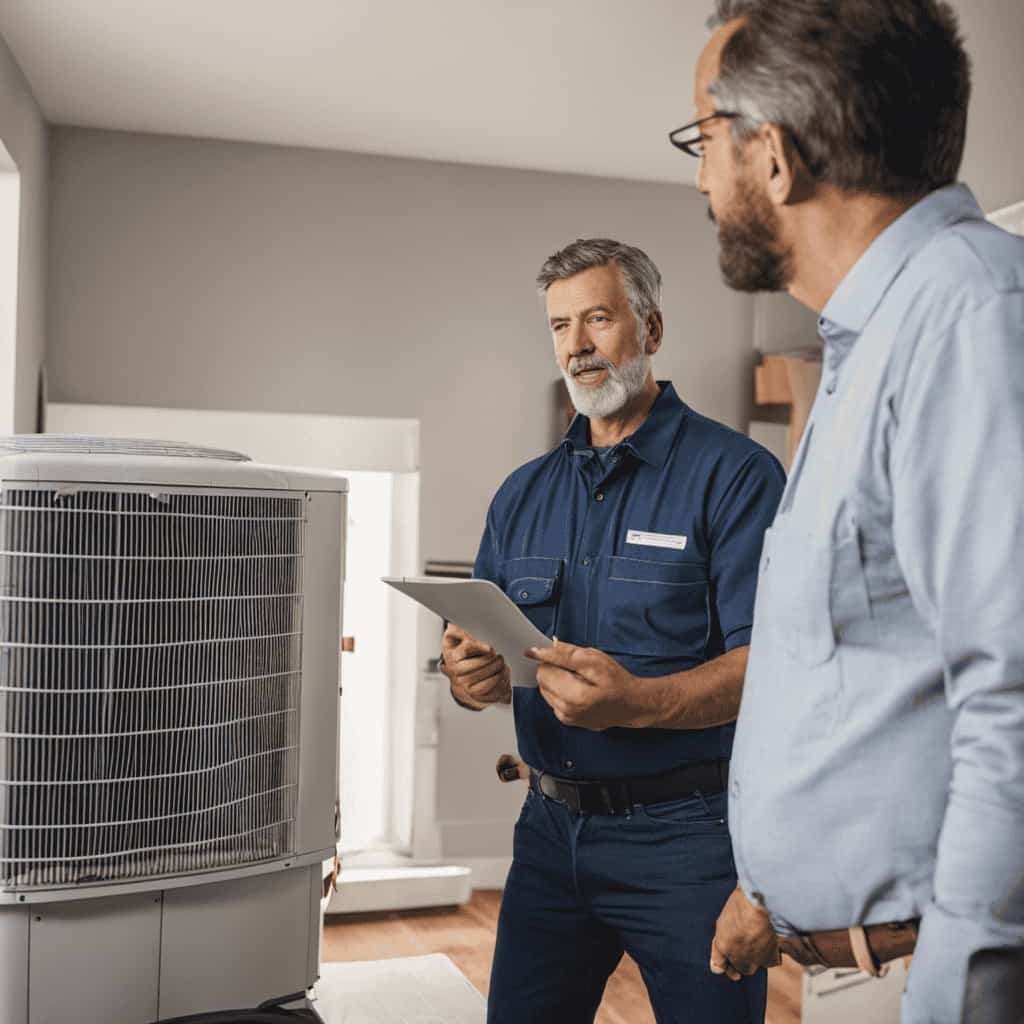
Geothermal Heat Pumps
Unraveling the Endurance of Geothermal Heat Pump Functionality

Exploring the capabilities of geothermal heat pumps, we uncover a valuable asset often underestimated in terms of durability.
Picture this: a system that harnesses the earth’s natural warmth to provide efficient heating and cooling year-round. It’s like having a reliable companion by your side, always ready to keep you comfortable and save you energy.
In this article, we’ll unravel the secrets of geothermal heat pumps, exploring their inner workings and the environmental benefits they bring.
Join us on this intimate journey of discovery.
Key Takeaways
- Geothermal heat pumps provide sustainable and efficient heating and cooling by extracting heat from the ground during winter and removing heat from the home during summer.
- Ground loop installation is crucial for the efficient functioning of geothermal heat pump systems as it efficiently transfers heat between the system and the Earth, utilizing the stable temperature of the Earth for consistent thermal energy.
- Geothermal heat pumps offer cost savings through reduced utility bills, lower maintenance costs, and a longer lifespan, making them a wise investment for homeowners. Tax incentives and rebates are also available for installing these systems.
- Geothermal heat pump technology has significant environmental benefits, including lower greenhouse gas emissions, a smaller carbon footprint, improved air quality, and reduced strain on power grids, potentially decreasing the need for additional power plants.
The Basics of Geothermal Heat Pump Technology
We believe that understanding the basics of geothermal heat pump technology is crucial for grasping its functionality and benefits.
By harnessing the Earth’s natural heat, geothermal heat pumps provide a sustainable and efficient way to heat and cool homes. These systems work by extracting heat from the ground during winter and transferring it indoors, while in the summer, they remove heat from the home and dissipate it into the cooler ground.
Geothermal heat pumps consist of three main components: the ground loop, heat pump unit, and the distribution system. The ground loop is buried underground and contains a series of pipes filled with a heat transfer fluid that absorbs or releases heat.
The heat pump unit then extracts or deposits heat from the fluid, while the distribution system circulates the conditioned air throughout the building.
Understanding these components lays the foundation for comprehending the remarkable functionality and benefits of geothermal heat pump technology.
Understanding the Inner Workings of Geothermal Heat Pumps
Let’s now take a closer look at the inner workings of geothermal heat pumps.
One key aspect is their efficient energy transfer, which allows them to extract heat from the ground and use it to heat our homes.
Another important factor is the ground loop installation, where pipes are buried underground to facilitate the transfer of heat.

Lastly, we can’t overlook the long-term cost savings that geothermal heat pumps offer, as they can significantly reduce energy consumption and lower utility bills.
Efficient Energy Transfer
To begin understanding the inner workings of geothermal heat pumps, let’s delve into the efficient energy transfer process. Here’s a glimpse into how it all works:
Ground loop system: The heart of a geothermal heat pump is its ground loop. This loop, buried beneath the earth’s surface, circulates a mixture of water and antifreeze, absorbing heat from the ground during winter and dissipating heat into the ground during summer.
Heat pump unit: The heat pump unit extracts the heat from the ground loop and transfers it to the indoor air distribution system. It uses a compressor and a refrigerant to amplify the heat energy, making it capable of heating your home even in colder weather.

Indoor air distribution system: This system distributes the heated air throughout your home using a network of ducts and vents. It ensures that every corner of your living space is warmed up effectively and efficiently.
Thermostat control: A thermostat allows you to set and maintain the desired temperature in your home. It works in tandem with the heat pump unit to optimize energy usage and keep your comfort level just right.
Understanding these key elements of efficient energy transfer will help you appreciate the inner workings of geothermal heat pumps and their ability to provide reliable and sustainable heating and cooling for your home.
Ground Loop Installation
Installing the ground loop is a crucial step in understanding the inner workings of geothermal heat pumps. It’s like the veins that carry the lifeblood of the system, allowing it to function efficiently and sustainably.
The ground loop installation involves digging trenches or drilling boreholes, where pipes are laid in a closed-loop configuration. These pipes circulate a mixture of water and antifreeze, absorbing heat from the ground in winter and transferring it to the heat pump, and vice versa in summer. This process relies on the stable temperature of the earth to provide a consistent source of thermal energy.
Long-Term Cost Savings
As we delve deeper into understanding the inner workings of geothermal heat pumps, it becomes evident that long-term cost savings are achieved through their efficient utilization of natural thermal energy. Here’s how geothermal heat pumps help you save money over time:
Reduced utility bills: Geothermal heat pumps use the Earth’s constant temperature to heat and cool your home, reducing your reliance on traditional heating and cooling systems that consume more energy.
Lower maintenance costs: Geothermal heat pumps have fewer mechanical components compared to conventional systems, resulting in reduced maintenance and repair expenses.

Longer lifespan: Geothermal heat pumps are built to last, with an average lifespan of 20 to 25 years, providing you with long-term savings by minimizing the need for replacements.
Tax incentives and rebates: Many governments and utility companies offer incentives and rebates for installing geothermal heat pump systems, further reducing your upfront costs.
By taking advantage of these cost-saving benefits, geothermal heat pumps prove to be a wise investment for homeowners seeking both comfort and financial stability.
Now, let’s explore the role of ground loops in geothermal heat pump systems.
The Role of Ground Loops in Geothermal Heat Pump Systems
We rely on ground loops to efficiently transfer heat between the geothermal heat pump system and the Earth. Ground loops are an essential component of geothermal heat pump systems, playing a crucial role in their functionality.
These loops consist of pipes buried underground, typically filled with a mixture of water and antifreeze solution. As the geothermal heat pump operates, it circulates this fluid through the ground loops, extracting heat from the Earth during the winter and dissipating excess heat during the summer.
The loops facilitate the transfer of heat, ensuring that the system can efficiently heat or cool our homes. By utilizing the stable temperature of the Earth, ground loops allow geothermal heat pump systems to provide consistent and reliable indoor comfort while minimizing energy consumption.
Exploring the Efficiency of Geothermal Heat Pump Technology
Let’s now turn our attention to the efficiency of geothermal heat pump technology.
One of the key advantages of these systems is their energy savings potential. By utilizing the constant temperature of the ground, geothermal heat pumps can significantly reduce energy consumption compared to traditional heating and cooling systems.
Additionally, an assessment of their environmental impact reveals that they produce fewer greenhouse gas emissions, making them a more sustainable choice for heating and cooling needs.
Energy Savings Potential
Geothermal heat pump technology has the potential to achieve energy savings of up to 50% compared to traditional heating and cooling systems.
Imagine the comfort of a home where the temperature remains consistent throughout the year, without the need for constant adjustments.
Picture a system that efficiently transfers heat from the ground to your living space, reducing the need for excessive energy consumption.
Envision a future where your energy bills are significantly lower, allowing you to invest in other areas of your life.
With geothermal heat pump technology, these dreams can become a reality. By tapping into the Earth’s natural heat, this innovative system maximizes energy efficiency, providing you with both financial and environmental benefits.
Environmental Impact Assessment
How does the efficiency of geothermal heat pump technology impact the environment?
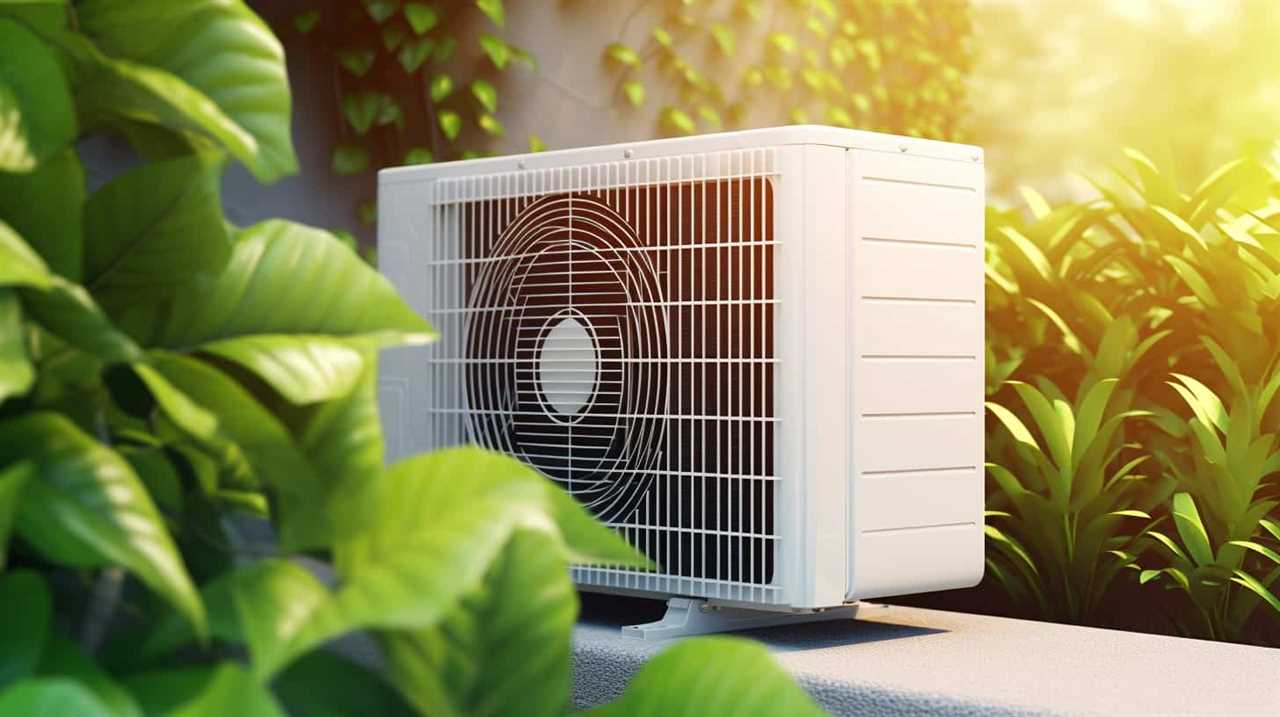
When it comes to the environmental impact assessment of geothermal heat pump technology, we find that its efficiency plays a crucial role. By utilizing the heat stored in the ground, these pumps can efficiently heat and cool buildings, reducing the need for traditional heating and cooling methods that rely on fossil fuels.
This reduction in fossil fuel consumption directly translates to lower greenhouse gas emissions, leading to a smaller carbon footprint. Additionally, geothermal heat pumps don’t release any harmful pollutants into the air, making them a cleaner alternative.
Furthermore, the efficiency of these pumps also contributes to a decrease in energy demand, reducing the strain on power grids and potentially decreasing the need for additional power plants.
Uncovering the Environmental Benefits of Geothermal Heat Pumps
We can explore the environmental benefits of geothermal heat pumps. Here are four reasons why they’re a sustainable choice for heating and cooling our homes:
Reduced carbon footprint: Geothermal heat pumps use the Earth’s natural heat, resulting in significantly lower greenhouse gas emissions compared to traditional heating and cooling systems. By choosing geothermal, we can actively contribute to reducing our carbon footprint.
Energy efficiency: Geothermal heat pumps are highly efficient, using minimal energy to transfer heat between the ground and our homes. This efficiency translates into lower energy consumption and reduced utility bills, making it an eco-friendly and cost-effective solution.
Renewable energy source: Unlike fossil fuels, which are finite and contribute to climate change, geothermal energy is a renewable resource. By harnessing this clean and abundant energy, we can embrace a more sustainable future.
Improved air quality: Geothermal heat pumps don’t burn fuel or release pollutants into the air. This means cleaner indoor and outdoor air quality, creating a healthier environment for us and our loved ones.

Choosing geothermal heat pumps not only benefits the planet but also creates a more sustainable and comfortable living space for us all.
Overcoming Challenges in Geothermal Heat Pump Installation
When it comes to installing geothermal heat pumps, our team has successfully navigated various challenges in order to ensure efficient and effective functionality. We understand the importance of overcoming these obstacles to provide a reliable and sustainable heating and cooling solution for your home.
One of the main challenges we encounter is the initial cost of installation. Geothermal heat pump systems require a significant upfront investment, but the long-term energy savings and environmental benefits outweigh this expense.
Another challenge we face is finding suitable land for the installation of the ground loop system. We carefully assess the geological conditions and available space to determine the optimal configuration for your geothermal heat pump.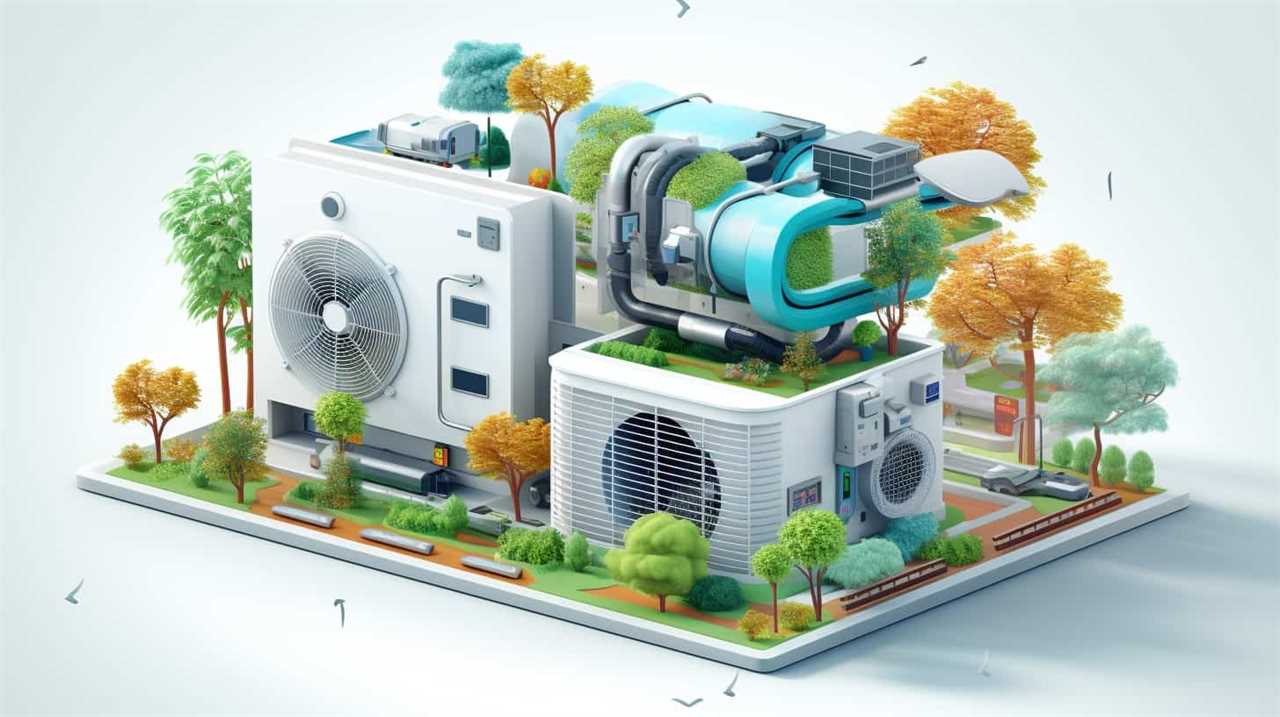
Additionally, we ensure that our team is well-trained and knowledgeable in the latest installation techniques to guarantee a seamless and hassle-free experience for you, our valued customer.
Maintenance and Troubleshooting for Geothermal Heat Pumps
Maintaining and troubleshooting geothermal heat pumps is essential to ensure their long-term functionality and efficiency. Here are four crucial steps to keep your geothermal heat pump running smoothly:
Regular filter cleaning: Cleaning or replacing the filters every few months helps maintain proper airflow and prevents dust and dirt buildup, ensuring optimal performance.
Checking refrigerant levels: Low refrigerant levels can decrease the system’s efficiency. Regularly monitoring and topping up refrigerant levels when necessary keeps the heat pump operating at maximum capacity.

Inspecting the heat exchanger: Routine inspections of the heat exchanger for any leaks or corrosion can prevent potential malfunctions and ensure the system’s longevity.
Testing electrical connections: Periodically checking the electrical connections and control panel helps identify any loose connections or faulty components, preventing system failures.
Extending the Lifespan of Geothermal Heat Pump Systems
Let’s talk about how we can extend the lifespan of geothermal heat pump systems.
By following maintenance best practices, such as regular filter cleaning and inspection of components, we can ensure optimal functionality and longevity.
Additionally, implementing system longevity tips, such as proper insulation and regular system checks, can help prevent issues and extend the life of the heat pump.
Lastly, enhancing energy efficiency through measures like programmable thermostats and geothermal loop optimization can’t only reduce operating costs but also contribute to the overall longevity of the system.
Maintenance Best Practices
To ensure the longevity of geothermal heat pump systems, we must regularly perform maintenance tasks such as cleaning filters and inspecting ductwork. By following these maintenance best practices, we can extend the lifespan of our geothermal heat pump systems and ensure optimal performance:
Clean the filters: Regularly clean or replace the filters to maintain proper airflow and prevent dirt and debris from clogging the system.

Inspect the ductwork: Check for any leaks or damage in the ductwork to ensure efficient heat transfer and prevent energy loss.
Lubricate moving parts: Keep the system running smoothly by lubricating the motor, fan, and other moving parts to reduce friction and prolong their lifespan.
Check refrigerant levels: Regularly monitor and maintain the proper refrigerant levels to ensure efficient heat transfer and prevent system malfunctions.
System Longevity Tips
How can we effectively extend the lifespan of our geothermal heat pump systems?
One key tip is to ensure regular maintenance and inspections by qualified technicians. By having professionals check our systems regularly, we can identify and address any potential issues before they escalate into major problems.
Additionally, it’s important to keep the system clean and free from debris, as this can help prevent clogs and improve its overall efficiency.
Another tip is to monitor and adjust the settings of the heat pump system according to the specific needs of our home. By optimizing the system’s performance, we can avoid unnecessary strain and extend its lifespan.
By following these longevity tips, we can ensure that our geothermal heat pump systems continue to serve us efficiently for years to come.

And speaking of efficiency, let’s now explore ways to enhance the energy efficiency of these systems.
Enhancing Energy Efficiency
By optimizing our system’s settings and implementing energy-efficient practices, we can enhance the energy efficiency and extend the lifespan of our geothermal heat pump systems. Here are four ways we can achieve this:
Regular maintenance: Just like any other system, our geothermal heat pump needs regular maintenance to ensure optimal performance. This includes cleaning or replacing air filters, checking refrigerant levels, and inspecting electrical connections.
Proper insulation: Insulating our homes effectively helps to minimize heat loss and gain, reducing the workload on our geothermal heat pump. This means sealing any cracks or gaps in windows, doors, and walls, as well as adding insulation to our attic and basement.

Smart thermostat usage: Using a programmable or smart thermostat allows us to control our geothermal heat pump more efficiently. We can set temperature schedules to match our daily routines and even adjust settings remotely using our smartphones.
Energy-efficient habits: Simple habits like turning off lights when not in use, using natural lighting whenever possible, and unplugging electronics when they’re not being used can significantly reduce our overall energy consumption.
Optimizing Energy Savings With Geothermal Heat Pumps
Our research reveals that implementing proper maintenance and insulation measures can significantly enhance energy savings with geothermal heat pumps.
By taking proactive steps to maintain and optimize the performance of your geothermal heat pump system, you can maximize its energy efficiency and ultimately save on your energy bills. Regular maintenance, such as cleaning or replacing air filters, checking refrigerant levels, and inspecting the system for any leaks or malfunctions, can ensure that your heat pump is operating at its peak efficiency.
Additionally, proper insulation of your home can prevent energy loss and minimize the workload on your heat pump. By sealing windows, doors, and ductwork, and adding insulation to walls, ceilings, and floors, you can create a more energy-efficient environment that allows your heat pump to work more effectively.
Taking these steps won’t only optimize your energy savings but also contribute to the long-term durability and functionality of your geothermal heat pump system.
Comparing Geothermal Heat Pumps to Traditional Heating and Cooling Systems
We found that geothermal heat pumps provide more energy-efficient heating and cooling compared to traditional systems. Here’s why:
Geothermal heat pumps utilize the natural heat stored beneath the Earth’s surface, making them highly efficient in extracting and transferring heat.

Traditional heating and cooling systems rely on burning fossil fuels or using electricity, resulting in higher energy consumption and carbon emissions.
Geothermal systems can provide both heating and cooling, eliminating the need for separate systems and reducing overall energy usage.
These heat pumps operate quietly and have a longer lifespan compared to traditional systems, providing reliable and sustainable comfort for years to come.
With geothermal heat pumps offering superior energy efficiency and a range of benefits, it’s clear why they’re becoming increasingly popular.
However, future innovations in geothermal heat pump technology promise even greater advancements. Let’s explore these exciting developments in the next section.
Future Innovations in Geothermal Heat Pump Technology
Let’s explore the potential advancements in geothermal heat pump technology that will shape the future of heating and cooling systems. The continuous evolution of geothermal heat pump technology offers exciting possibilities for improving efficiency, enhancing performance, and increasing sustainability. Here are some future innovations that we can look forward to:
| Innovation | Description | Benefits |
|---|---|---|
| Advanced Sensors | Utilizing advanced sensors to monitor and optimize system performance in real-time. | Improved energy efficiency, enhanced comfort, and reduced maintenance costs. |
| Smart Controls | Integrating smart controls that learn and adapt to user preferences and environmental conditions. | Increased convenience, personalized comfort, and energy savings. |
| Enhanced Ground Loop Design | Developing innovative ground loop designs to maximize heat transfer efficiency and minimize installation costs. | Improved system performance, reduced installation time and cost, and increased scalability. |
| Hybrid Systems | Combining geothermal heat pumps with other renewable energy sources like solar or wind power. | Enhanced energy efficiency, reduced carbon footprint, and increased energy independence. |
These advancements promise to revolutionize the way we heat and cool our homes, providing more efficient, sustainable, and cost-effective solutions for a greener future.
Frequently Asked Questions
How Much Does It Cost to Install a Geothermal Heat Pump System?
Installing a geothermal heat pump system can be costly, but it offers long-term energy savings. The upfront costs depend on factors like the size of the system and the complexity of the installation.
Are Geothermal Heat Pumps Suitable for All Types of Homes or Buildings?
Yes, geothermal heat pumps are suitable for most homes and buildings. They provide reliable heating and cooling while reducing energy costs. We’ve found them to be a great investment with long-lasting functionality.
Can a Geothermal Heat Pump System Be Integrated With Existing HVAC Systems?
Yes, a geothermal heat pump system can be integrated with existing HVAC systems. It offers increased efficiency and cost savings. We’ve found that it’s a viable option for many homes and buildings.
Are There Any Government Incentives or Tax Credits Available for Installing Geothermal Heat Pump Systems?
Yes, there are government incentives and tax credits available for installing geothermal heat pump systems. These incentives can significantly offset the initial investment and make the transition to a more sustainable HVAC system more affordable.
How Long Does It Take to Recoup the Initial Investment in a Geothermal Heat Pump System Through Energy Savings?
It typically takes 5-10 years to recoup the initial investment in a geothermal heat pump system through energy savings. This can vary depending on factors such as energy prices and system efficiency.
What Makes Geothermal Pumps a Reliable Source of Heat?
Geothermal pumps are an ingenious way to harness earth’s core with geothermal pumps, making them a highly reliable source of heat. By utilizing the constant temperature underground, these pumps extract thermal energy and deliver it to buildings for heating purposes. With their efficiency, low maintenance requirements, and long lifespan, geothermal pumps offer an environmentally friendly and sustainable solution to meet heating needs.
Conclusion
In conclusion, geothermal heat pump technology offers a sustainable and efficient solution for heating and cooling.
By harnessing the natural heat from the Earth, these systems provide long-lasting functionality and environmental benefits.
With proper maintenance and optimization, the lifespan of geothermal heat pump systems can be extended, maximizing energy savings for years to come.
So, why settle for traditional heating and cooling systems when geothermal heat pumps offer a promising future of innovation and cost-effective solutions?
Geothermal Heat Pumps
Unveiling the Efficiency of Geothermal Heat Pump Systems

Join us on a journey as we uncover the hidden power of **geothermal heat pump systems**. These amazing systems harness the natural warmth of the Earth to provide heating and cooling options for your home. Discover the magic beneath the surface and see how these systems can revolutionize the way you maintain your home comfort. Start exploring today!
Discover the factors that impact their efficiency and the benefits of choosing a high-efficiency system. We’ll guide you through evaluating energy efficiency ratings, proper installation, and maintenance practices.
Get ready to compare the efficiency of geothermal heat pump systems to traditional methods and unlock a world of energy-saving possibilities.
Key Takeaways
- Geothermal heat pump systems are highly efficient and require less energy compared to traditional methods.
- Proper system sizing, design, and installation impact the efficiency of geothermal heat pump systems.
- Regular maintenance is essential for maximizing the benefits of high-efficiency geothermal heat pump systems.
- Geothermal heat pump systems offer significant energy savings, reduced environmental impact, and a comfortable indoor environment.
Understanding Geothermal Heat Pump Systems Efficiency
Let’s delve into the efficiency of geothermal heat pump systems to better understand how they work.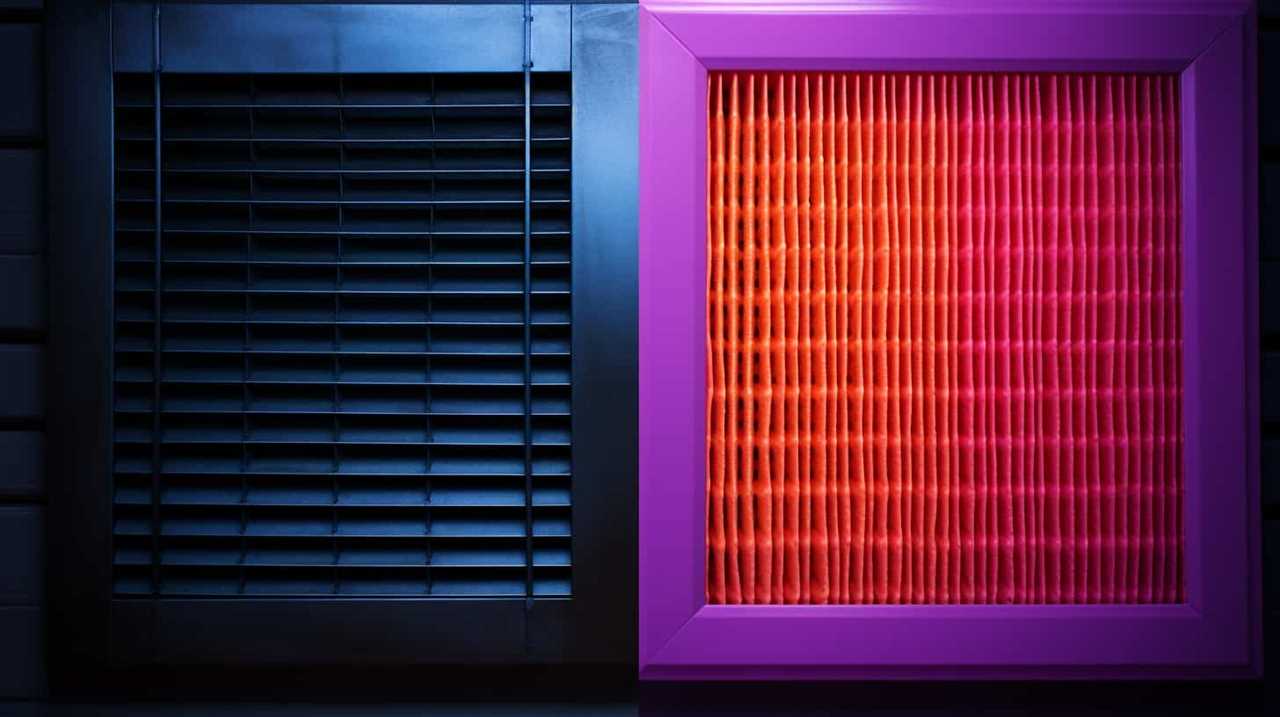
When it comes to heating and cooling our homes, we all want systems that aren’t only effective but also energy efficient. Geothermal heat pump systems offer just that.
These systems use the stable temperature of the earth to provide heating in the winter and cooling in the summer, making them highly efficient. By extracting heat from the ground and transferring it indoors, these systems require less energy compared to traditional heating and cooling methods.
The efficiency of geothermal heat pump systems is influenced by several factors, which we’ll explore in the next section. Understanding these factors will help us maximize the efficiency and effectiveness of these systems in our homes.
Factors Affecting the Efficiency of Geothermal Heat Pump Systems
We will now explore the factors that affect the efficiency of geothermal heat pump systems. Understanding these factors is crucial for maximizing the performance and energy savings of your system. Here are some key factors to consider: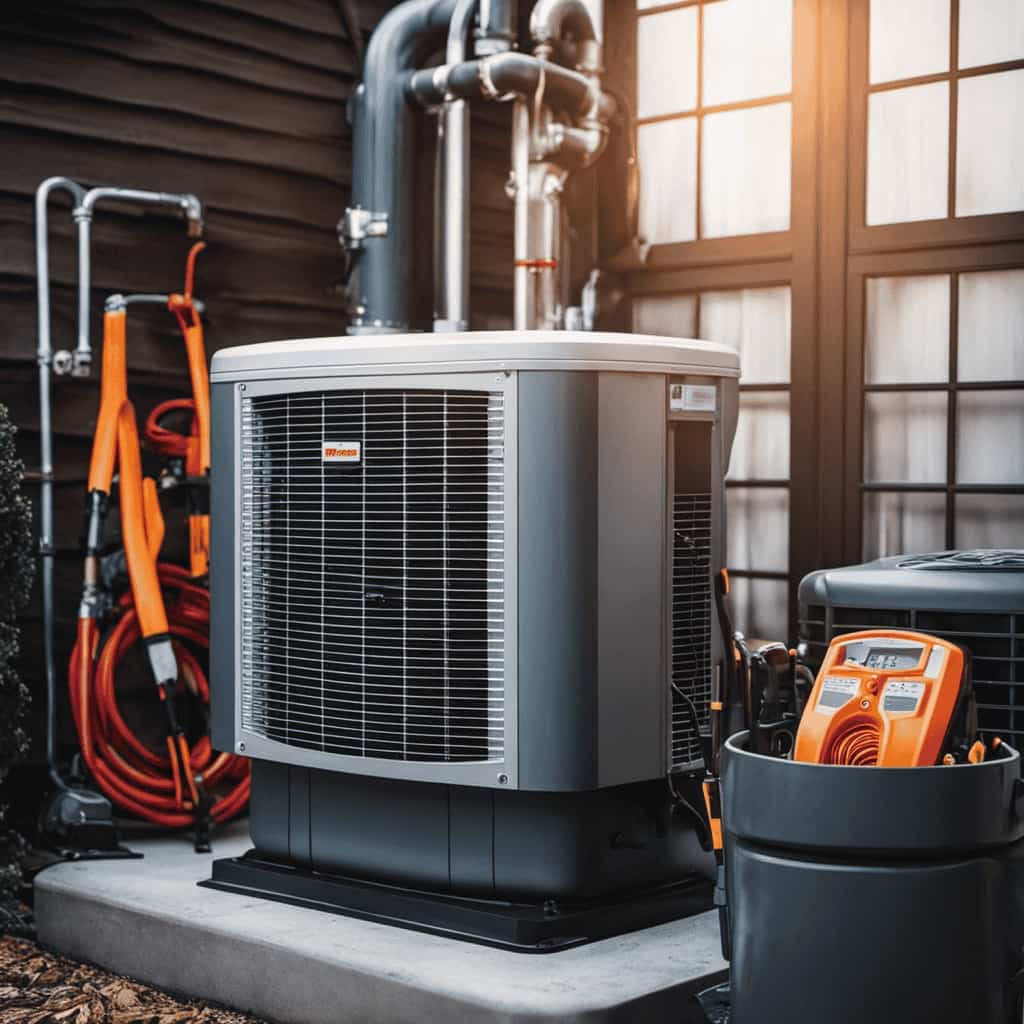
-
Proper system sizing: Ensuring that your geothermal heat pump system is correctly sized for your home or building is essential for optimal efficiency.
-
Ground loop design: The design and installation of the ground loop system, which transfers heat between the ground and your heat pump, can significantly impact efficiency.
-
Insulation: Adequate insulation in your home or building helps retain heat, reducing the workload on the geothermal heat pump system.
-
Maintenance: Regular maintenance, including cleaning, checking refrigerant levels, and inspecting components, is essential for keeping your system running efficiently.

By paying attention to these factors, you can enjoy the benefits of high efficiency geothermal heat pump systems, including reduced energy consumption, lower utility bills, and a smaller carbon footprint.
Now, let’s delve into the next section to explore these benefits in more detail.
Benefits of High Efficiency Geothermal Heat Pump Systems
High efficiency geothermal heat pump systems offer numerous benefits, including significant energy savings and reduced environmental impact.
These systems can help us save on our energy bills by efficiently transferring heat from the ground to our homes, reducing the need for traditional heating and cooling methods.
Not only do they provide a comfortable indoor environment, but they also have a minimal impact on the environment. By utilizing the constant temperature of the earth, high efficiency geothermal heat pump systems require less energy to operate compared to conventional systems, which rely on fossil fuels.
This reduces greenhouse gas emissions and helps combat climate change.
Additionally, these systems are quiet, require less maintenance, and have a longer lifespan, providing long-term cost savings and peace of mind.
Evaluating the Energy Efficiency Ratings of Geothermal Heat Pump Systems
When evaluating the energy efficiency ratings of geothermal heat pump systems, there are three key points to consider.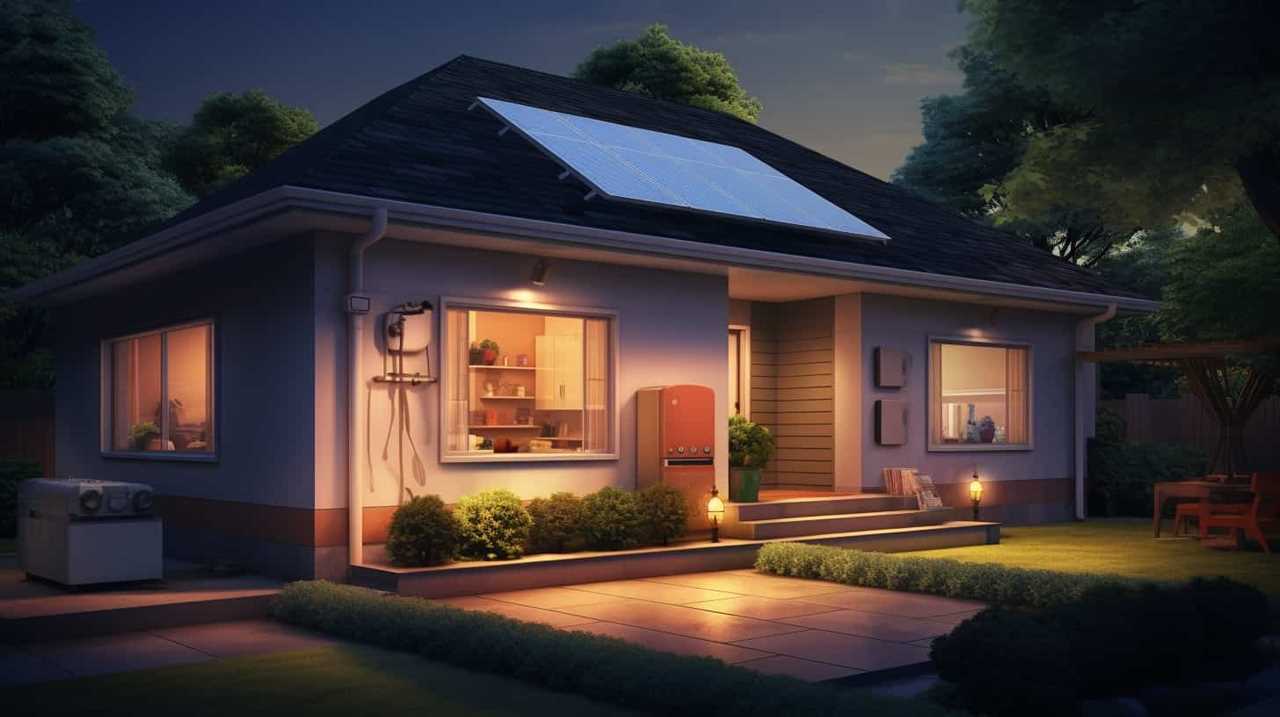
Firstly, the energy savings potential is significant, as these systems can reduce energy consumption by up to 70%.
Additionally, they offer environmental benefits by reducing greenhouse gas emissions and reliance on fossil fuels.
Lastly, a cost-effectiveness analysis is crucial to determine the long-term savings and return on investment.
Energy Savings Potential
How can we evaluate the energy efficiency ratings of geothermal heat pump systems to determine their energy savings potential?

Evaluating the energy efficiency ratings of geothermal heat pump systems is crucial in determining their energy savings potential. Here are some key factors to consider:
-
Coefficient of Performance (COP): This rating measures the efficiency of the system by comparing the amount of heat produced to the amount of electricity consumed. A higher COP indicates better energy efficiency.
-
Energy Efficiency Ratio (EER): This ratio determines the cooling efficiency of the system and is calculated by dividing the cooling output by the electrical input. A higher EER signifies greater energy savings.
-
Seasonal Energy Efficiency Ratio (SEER): SEER measures the cooling efficiency over an entire cooling season, taking into account the varying climate conditions. A higher SEER rating indicates better energy efficiency.

-
Heating Seasonal Performance Factor (HSPF): HSPF measures the heating efficiency over an entire heating season. A higher HSPF signifies better energy savings potential.
Environmental Benefits
We can evaluate the environmental benefits of geothermal heat pump systems by analyzing their energy efficiency ratings. These ratings provide us with valuable information about how well the system utilizes energy and reduces greenhouse gas emissions. Geothermal heat pump systems have been found to be highly efficient, with energy efficiency ratings often exceeding 300%. This means that for every unit of energy consumed, the system is capable of producing three units of heat or cooling. Not only does this result in significant energy savings, but it also reduces the reliance on fossil fuels and decreases the carbon footprint. By using renewable geothermal energy, these systems contribute to a cleaner and more sustainable environment.
| Energy Efficiency Rating | Environmental Benefits |
|---|---|
| Above 300% | Reduced greenhouse gas emissions |
| Energy savings | |
| Decreased reliance on fossil fuels |
Cost-Effectiveness Analysis
Geothermal heat pump systems offer a highly cost-effective solution due to their exceptional energy efficiency ratings. When evaluating the cost-effectiveness of these systems, consider the following:
-
Lower energy bills: Geothermal heat pump systems can reduce energy consumption by up to 50%, resulting in significant savings on monthly utility bills.

-
Long-term savings: Although the upfront cost of installation may be higher compared to traditional heating and cooling systems, the long-term savings from reduced energy usage can quickly offset the initial investment.
-
Increased property value: Installing a geothermal heat pump system can increase the value of your property, making it an attractive feature for potential buyers.
-
Tax incentives and rebates: Many governments and utility companies offer incentives and rebates for installing energy-efficient systems, further reducing the overall cost.
Enhancing Efficiency Through Proper Installation and Maintenance of Geothermal Heat Pump Systems
To enhance efficiency, we must prioritize the proper installation and maintenance of geothermal heat pump systems.
When it comes to installation, it’s crucial to work with experienced professionals who understand the specific requirements of geothermal systems. They’ll ensure that the system is correctly sized, the loops are designed and installed properly, and the equipment is properly integrated into your home.
Regular maintenance is equally important to ensure optimal performance. This includes checking and cleaning filters, inspecting the loop system, and verifying the proper functioning of all components.
By giving attention to these details, we can maximize the efficiency of our geothermal heat pump systems and enjoy the benefits they offer.
Now, let’s explore how the efficiency of geothermal heat pump systems compares to traditional heating and cooling systems.
Comparing the Efficiency of Geothermal Heat Pump Systems to Traditional Heating and Cooling Systems
When comparing the efficiency of geothermal heat pump systems to traditional heating and cooling systems, there are three key points to consider.
First, geothermal systems have the potential for significant energy savings, as they tap into the constant temperature of the earth.
Second, they have a lower environmental impact, as they use renewable energy sources and produce fewer greenhouse gas emissions.
Energy Savings Potential
We can compare the efficiency of geothermal heat pump systems to traditional heating and cooling systems in terms of energy savings potential. With geothermal heat pump systems, you can expect significant energy savings compared to traditional systems. Here are some key points to consider:
- Geothermal heat pumps can provide up to 70% energy savings for heating and up to 50% energy savings for cooling.
- The systems utilize renewable energy from the earth, reducing reliance on fossil fuels and lowering greenhouse gas emissions.
- Geothermal heat pumps operate more efficiently than traditional systems, as they transfer heat rather than generate it.
- The constant temperature of the earth allows geothermal heat pumps to maintain consistent efficiency throughout the year.
Environmental Impact Comparison
How do geothermal heat pump systems compare to traditional heating and cooling systems in terms of their environmental impact? When it comes to the environmental impact, geothermal heat pump systems have a clear advantage over traditional systems. Traditional systems rely heavily on fossil fuels, such as natural gas or oil, which contribute to greenhouse gas emissions and air pollution. On the other hand, geothermal heat pump systems tap into the Earth’s natural heat, requiring minimal energy consumption. This results in significantly lower carbon emissions and air pollution. Additionally, geothermal systems do not require any on-site combustion, eliminating the risk of carbon monoxide leaks and other safety hazards associated with traditional systems. The table below provides a comparison of the environmental impact between geothermal heat pump systems and traditional heating and cooling systems.
| Environmental Impact | Geothermal Heat Pump Systems | Traditional Systems |
|---|---|---|
| Carbon Emissions | Low | High |
| Air Pollution | Minimal | Significant |
| Safety Hazards | None | Potential Risks |
Long-Term Cost Analysis
In terms of long-term cost analysis, we can compare the efficiency of geothermal heat pump systems to traditional heating and cooling systems. When considering the financial aspect, it’s important to weigh the initial investment against the long-term savings. Here are some key points to consider:
-
Geothermal heat pump systems have higher upfront costs but can provide significant energy savings over time.
-
Traditional heating and cooling systems rely on fossil fuels, which are subject to price fluctuations and can be expensive in the long run.

-
Geothermal systems use renewable energy from the earth, resulting in lower operational costs and reduced dependence on volatile fuel markets.
-
The energy efficiency of geothermal systems can lead to lower utility bills, making them a cost-effective choice in the long term.
Frequently Asked Questions
How Much Does It Cost to Install a Geothermal Heat Pump System?
It costs a significant amount to install a geothermal heat pump system, but the long-term energy savings and environmental benefits make it a worthwhile investment for our home.
Can a Geothermal Heat Pump System Be Used for Both Heating and Cooling?
Yes, a geothermal heat pump system can be used for both heating and cooling. It efficiently transfers heat to or from the ground, providing comfortable temperatures year-round while reducing energy consumption and costs.
Are Geothermal Heat Pump Systems Eligible for Any Government Incentives or Tax Credits?
Yes, geothermal heat pump systems are eligible for government incentives and tax credits. We can receive financial benefits for choosing an energy-efficient option that helps reduce our carbon footprint.
What Is the Lifespan of a Geothermal Heat Pump System?
The lifespan of a geothermal heat pump system can vary depending on factors such as maintenance and usage. However, with proper care, these systems can last for 20 to 25 years or more.
Can a Geothermal Heat Pump System Be Integrated With Existing HVAC Systems?
Yes, a geothermal heat pump system can be integrated with existing HVAC systems. It’s a cost-effective and efficient way to upgrade your heating and cooling system while reducing your carbon footprint.
Conclusion
So there you have it, folks. Geothermal heat pump systems are like the superheroes of energy efficiency. They swoop in, save the day, and keep your home cozy without breaking the bank.

Traditional heating and cooling systems? Well, let’s just say they’re stuck in the past, sipping on fossil fuels and draining your wallet.
It’s time to embrace the efficiency of geothermal heat pump systems and bid farewell to outdated energy hogs.
-

 Residential and Commercial Applications5 months ago
Residential and Commercial Applications5 months agoBest Amana Heat Pump Reviews
-

 Thermal Energy Transfer5 months ago
Thermal Energy Transfer5 months agoBreakthroughs in Modern Heat Pump Systems: Thermal Energy Edition
-

 Residential and Commercial Applications5 months ago
Residential and Commercial Applications5 months agoBest Heat Pump
-

 Geothermal Heat Pumps4 months ago
Geothermal Heat Pumps4 months agoUpgrade Your Comfort with Our Efficient HVAC Systems
-

 Geothermal Heat Pumps4 months ago
Geothermal Heat Pumps4 months agoInnovative Geothermal Heat Pump Manufacturers Revolutionize Energy Efficiency
-

 Air Conditioning3 months ago
Air Conditioning3 months agoExploring Energy-Efficient Air Conditioning Heat Pumps
-

 Thermal Energy Transfer2 months ago
Thermal Energy Transfer2 months agoBoost Your Heat Pump Efficiency: Interactive Guide
-

 Air Conditioning5 months ago
Air Conditioning5 months agoHeat Pumps Outperform Traditional Heating in Energy Use











